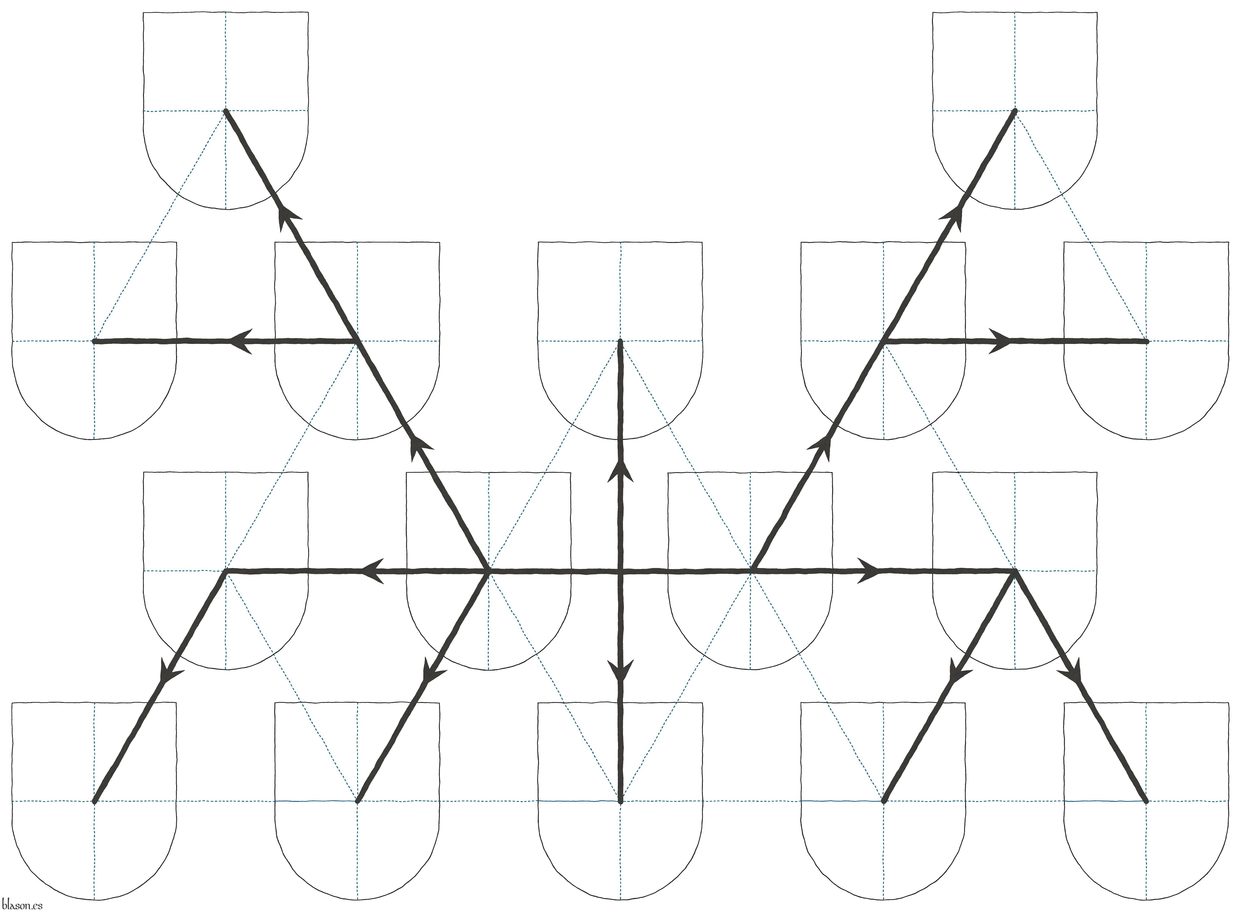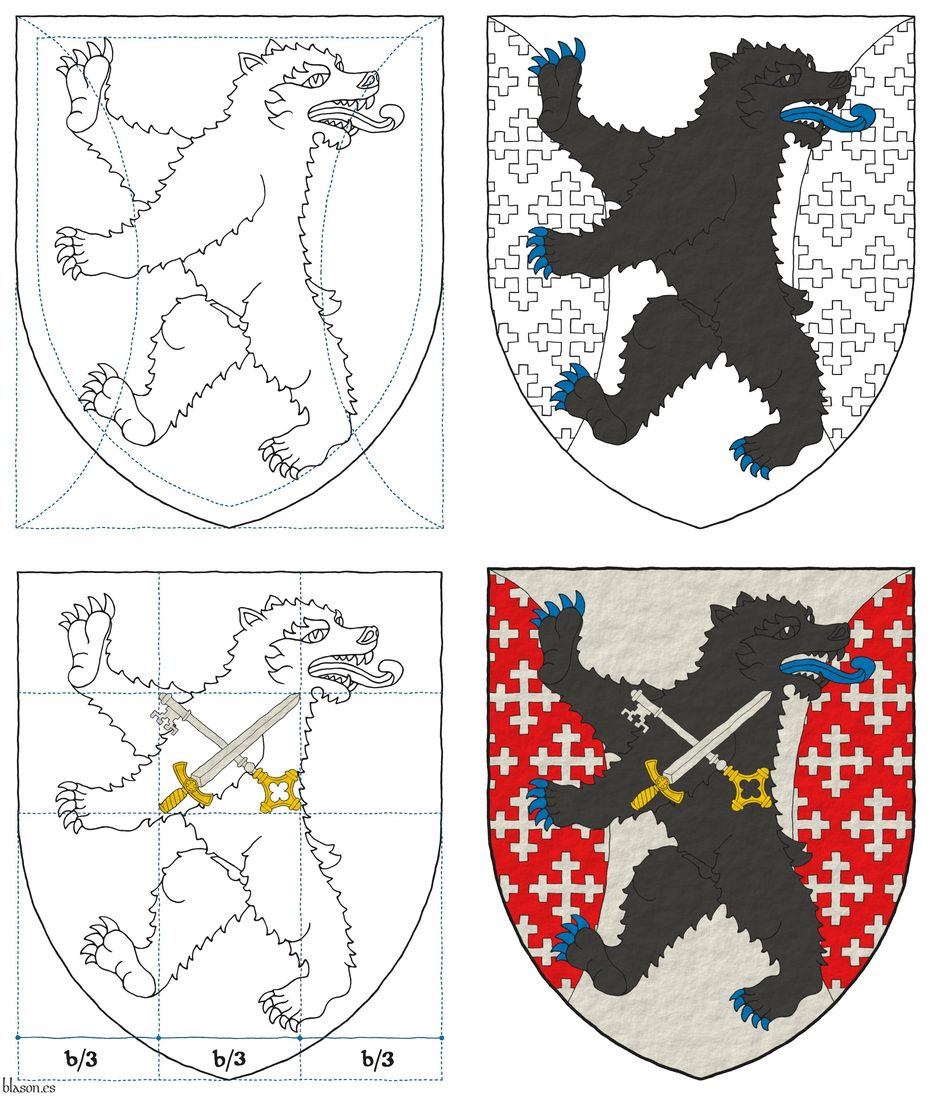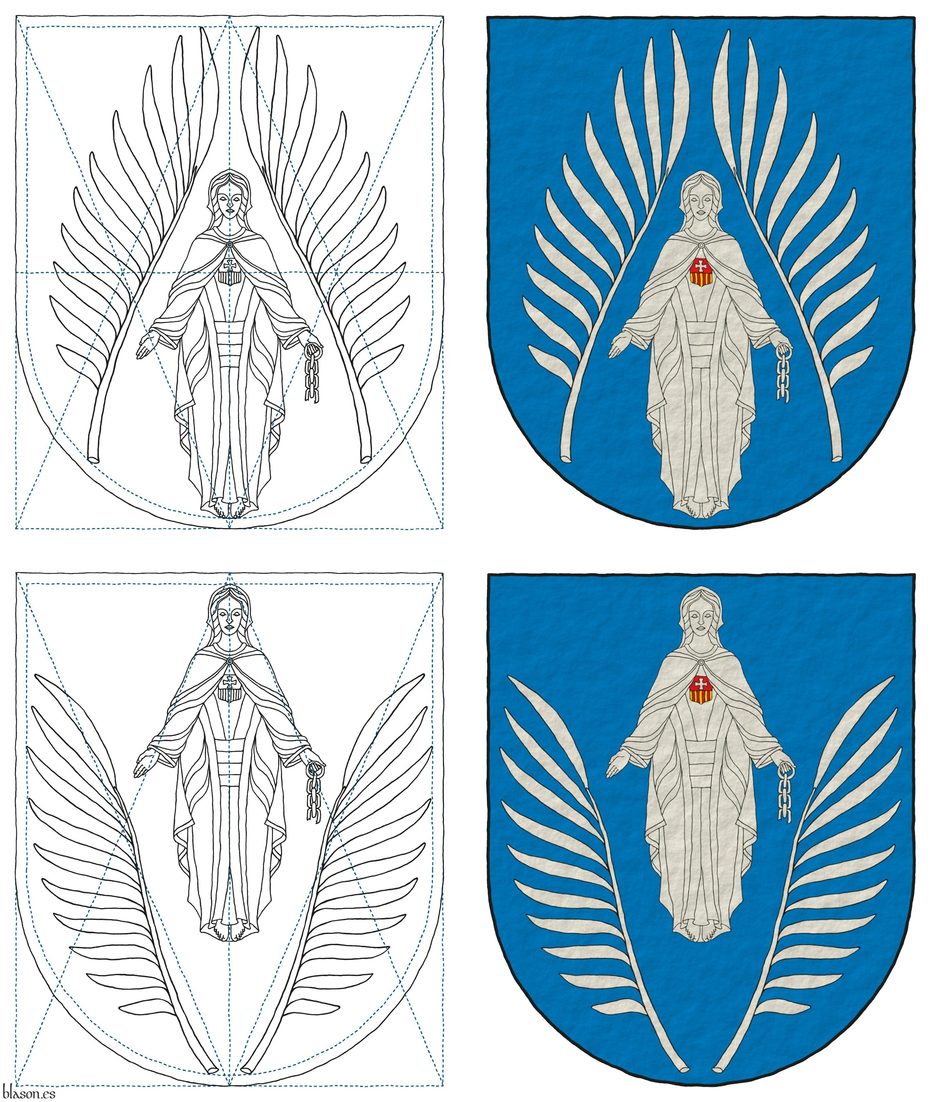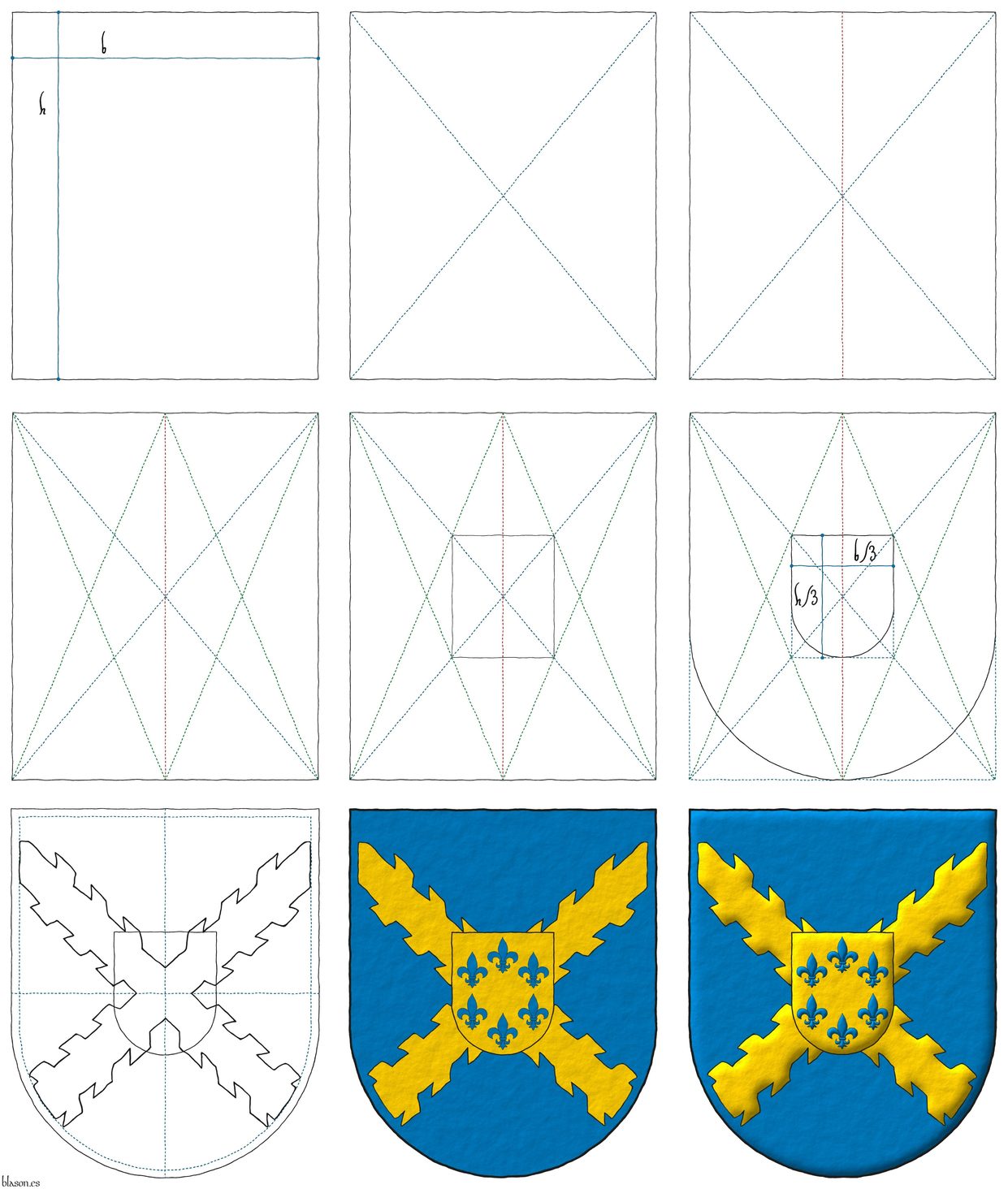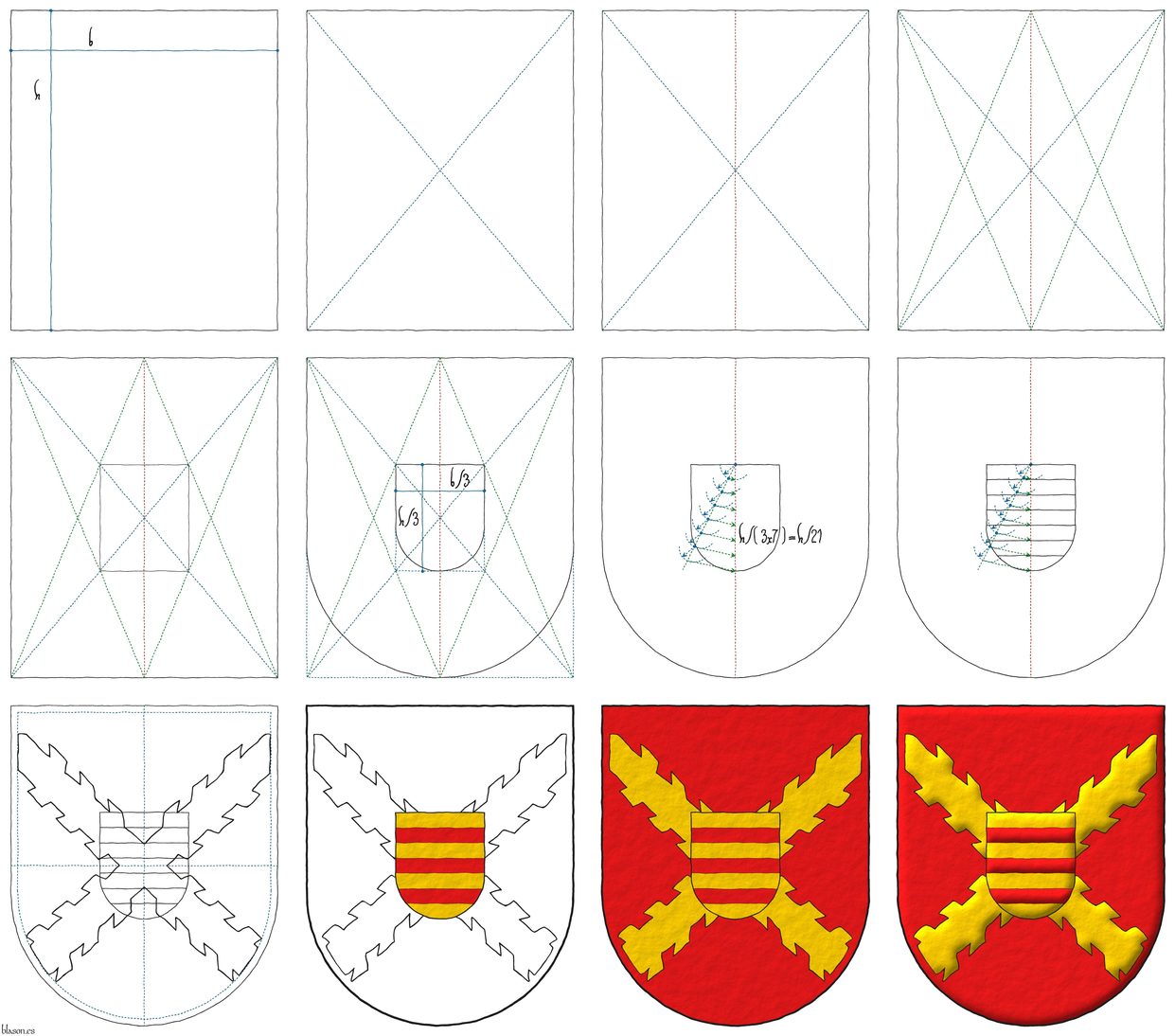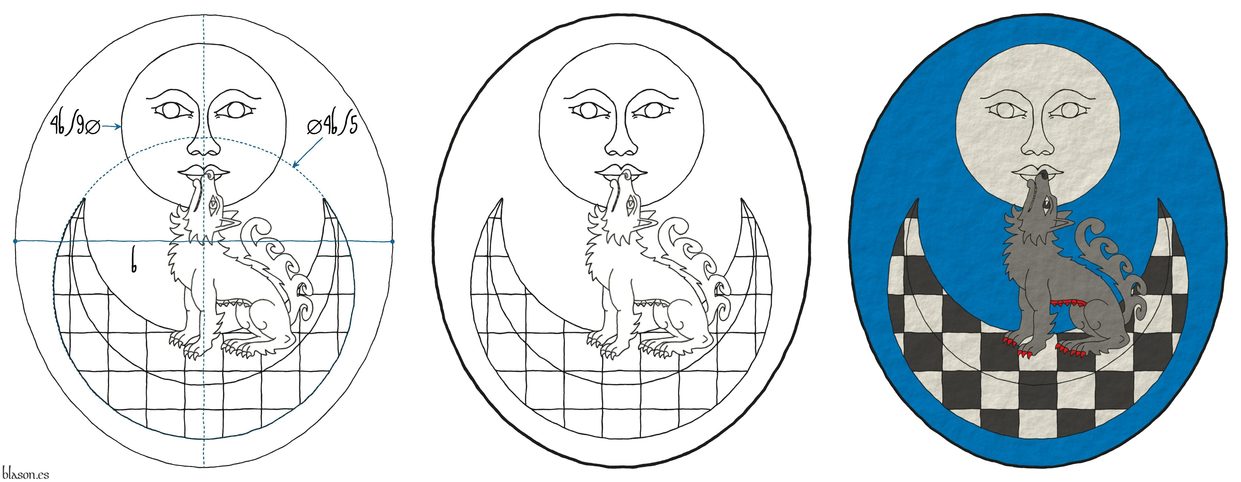Ratio

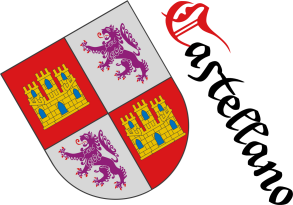
Alton Thompson, schema 2x3
Argent, a double tressure flory Sanguine, overall a raven (Corvus corax) volant saltirewise proper.
These are the arms of Alton Thompson of the family Josserand de Bourgogne emblazoned by me in 6 steps: 1, 2) structure and delineation of the double tressure, 3, 4) structure and delineation of the Corvus corax trian volant, 5) plain tincture, and 6) lights and shadows.
Blazon keywords: Argent, Gules, Sable, One, Double tressure, Flory, Overall, Raven, Volant, Saltirewise and Proper.
Style keywords: Ratio, Outlined, Outlined in sable, Plain tincture, Illuminated and Pointed.
Classification: Personal, Interpreted, Schema, Boa and Coat of arms.
Bearer: Thompson, Alton.


Arturo Taborda, schema 2x2
Azure, issuant from base a frog's head and from flanks its forelegs in chevron Or, in chief a mullet of seven points Argent.
Coat of arms of Arturo Taborda, Venezuela, emblazoned by me. Four-step schema showing how I planned the construction of this coat of arms, based on two in pale, centered circles, each with a diameter equal to half the width of the shield, the first circle is used to inscribe the mullet of seven points, and the second to inscribe the frog’s head, in addition, I extended the axes of two rays of the mullet, specifically the two that form the angle of a chevron, and used those two axes as guides for placing the frog’s forelegs.
Blazon keywords: Azure, Or, Argent, One, Seven, Issuant from base, Frog, Head, Flank, Foreleg, In chevron, In chief and Mullet.
Style keywords: Ratio, Outlined, Outlined in sable, Plain tincture and Ogee.
Classification: Personal, Interpreted, Schema, Boa and Coat of arms.
Bearer: Taborda, Arturo.


Baz Manning, schema 2x2
Or semé of millrinds Azure; a chief dancetty of two full points upwards Purpure pierced twice of the field billetwise throughout.
The coat of arms of Baz Manning, John Basil Edward, emblazoned by me in 4 steps. In the English blazon, I followed his style, and in the Spanish blazon, I followed mine, counting the pieces of the chief that fit from the perspective of the chief.
Blazon keywords: Or, Azure, Purpure, One, Two, Three, Semé, Millrind, Chief, Dancetty, Pierced, Billet and Throughout (chief base).
Style keywords: Ratio, Outlined, Outlined in sable, Plain tincture and Pointed.
Classification: Personal, Interpreted, Schema, Boa and Coat of arms.
Bearer: Manning, Baz.


Bertrand de Blanchefort two-step scheme
Barry of four per pale counterchanged Or and Gules.
Blazon keywords: Barry per pale counterchanged, Four, Or and Gules.
Style keywords: Outlined in sable, Semi-circular, Ratio and Plain tincture.
Classification: Religious, Military, Knights Templar, Interpreted, Coat of arms and Schema.
Bearer: Blanchefort, Bertrand de.


Brady Brim-DeForest, schema 1x2
Party per chevron Gules and Argent, two acorns slipped Or and in base a fleur de lis Azure.
Coat of arms of Brady Brim-DeForest. This is my initial design, made so that the color Gules occupies twice the surface area of the metal Argent.
Blazon keywords: Gules, Argent, Party per chevron, Acorn, Slipped, Base and Fleur de lis.
Style keywords: Ratio, Outlined, Outlined in sable, Plain tincture and Double pointed.
Classification: Personal, Interpreted, Schema, Boa and Coat of arms.
Bearer: Brim-DeForest, Brady.


Crepsi, schema 1x3
Party per pale: 1 Gules, in base a castle triple-towered Or, port and windows Azure, and masoned Sable; 2 Argent, in base a lion rampant Gules, crowned Or; overall a psi letter sable; a diminished bordure Or.
Coat of arms of Crepsi, military psychology, former Central Military Region, Kingdom of Spain emblazoned by me. These arms were designed by my lieutenant colonel and friend Miguel Angel Nuñez Amador. The image shows three steps of my artwork: a) ratio, b) outlined, and c) plain colors and metals. The Castilian «filiera» is a diminished bordure; its width is usually 1/2 or 1/3 of the width of the bordure. The bordure itself is usually 1/6 of the width of the coat of arms. Therefore, the «filiera» is typically 1/(2×6) = 1/12 or 1/(3×6) = 1/18 of the width of the coat of arms.
Blazon keywords: Gules, Argent, Or, Azure, Sable, Party per pale, In base, Castle, Triple-towered, Port and windows, Masoned, Lion, Rampant, Crowned, Overall, Letter and Diminished bordure.
Style keywords: Ratio, Outlined, Outlined in sable, Plain tincture and Semi-circular.
Classification: Military, Interpreted, Schema, Boa and Coat of arms.
Bearer: Crepsi.


Design with a fess between 4 water-bougets
Design ideas
The heraldic art often involves resolving design challenges while maintaining both aesthetic balance and adherence to tradition. The coat of arms illustrated here draws inspiration from the Dethick-Dethicke family arms of Derbyshire, though it features distinct differences. This design explores the placement of water-bougets, a medieval water vessel, in a 2+2 arrangement, with a fess vair.
One key consideration when arranging charges in heraldry is proportionality. In this case, the fess occupies 1/3 of the coat of arms's width and is positioned 1/3 of the height from the chief, rather than at the exact center, allowing the charges to balance harmoniously. The shape of the shield itself also plays a role: rounded shields can accommodate a 2+2 arrangement more comfortably than shields with a pointed base, which are better suited to 2+1 arrangements, this is de case of Dethick's arms.
Another challenge in heraldic design is asymmetry. To address the natural curves of the shield, the water-bougets may vary slightly in size or placement. This intentional asymmetry can help create a visually appealing composition that respects both tradition and the unique constraints of each design, because, heraldry is not only about rules but also about creativity.
Gules, a fess vair between four water-bougets Or, two in chief and two in base.
Escudo de gules, una faja de veros acompañada de cuatro pares de odres de oro, dos en jefe y dos en punta.
Water-bouget
In German, they are called «Wasserschlauch» in English «water-bougets» or «oges», and in French «bouses» or «chantepleures».
There is no specific heraldic term for them in Castilian. Based on «chantepleures», one could use «cantimploras», which are metallic or at least rigid. On the other hand, «oges» could translate as «odres», as they are typically made of leather as in this case. Additionally, since «water-bouget» are designed as a pair to be carried by a donkey or other animal, I have decided to use «par de odres» to convey the idea of one on each side of the animal.
In English, when there is a single charge, that is, a pair of water vessels, it is written in singular as «water-bouget», as can be seen in [Fox-Davies, A. C.; 1909; figure 551]. [Friar, S.; 1987; page 68] defines «bouget» as «...a stylized representation of a yoke supporting two leather waterbags».
Blazon keywords: Gules, One, Fess, Vair, Between, Four, Water-bouget, Or, Two, In chief and In base.
Style keywords: Ratio, Outlined, Outlined in sable, Illuminated, Semi-circular and Freehand.
Classification: Interpreted, Schema and Coat of arms.


Family Milian, schema 1x1
Tierced per bend: 1 vairy Or and Azure; 2 Azure, two ships in full sail, in bend Argent; 3 Or, four bars wavy Azure. Crest: Upon a helm, with a wreath Argent and Azure, a demi-red fox proper, grasping dexter four ears of wheat Or. Mantling: Azure doubled Argent. Motto: «Ignis Aurum Probat».
The crest, mantling and coat of arms of the Milian family. It was created and emblazoned by me with a 2:2:3 ratio. The ratio I most commonly use for the crest, helm, and shield is approximately 2:2:3, where 2 represents the height of the crest, 2 represents the height of the helm, and 3 represents the height of the shield.
Blazon keywords: Or, Azure, Argent, One, Two, Four, Tierced per bend, Vairy, Ship, Full sail, In bend, Bar, Wavy, Crest and mantling, Crest, Upon (wreath), Helm, Wreath, Demi, Fox, Rampant, Proper, Grasping, Dexter, Ear of wheat, Wheat and Mantling.
Style keywords: Ratio, Outlined in sable, Illuminated and Semi-circular.
Classification: Personal, Created, Schema, Boa and Coat of arms.
Bearer: Milian, family.


Felipe VI of Spain and the golden number
Quarterly: 1 Gules, a castle triple-towered Or, port and windows Azure, masoned Sable [for Castile]; 2 Argent, a lion rampant Purpure, armed and langued Gules, crowned Or [for Leon]; 3 Or, four pallets Gules [for Aragon]; 4 Gules, a chain orlewise, crosswise, and saltirewise Or, charged in the fess point with an emerald Vert [for Navarre]; enté en point Argent, a pomegranate proper, seeded Gules, slipped and leaved Vert [for Granada]; an inescutcheon Azure, three fleurs de lis Or, 2 and 1, a bordure Gules [for Bourbon]. Crest: A closed royal crown. The shield is surrounded by the Golden Fleece.
My interpretation endows the coat of arms of His Majesty King Felipe VI of Spain with the golden proportion, based on the golden number Phi, which is present in many works of art, in architecture, in mathematics, and in Nature itself; there are official arms established by Royal Decree 527/2014, and the arms shown here constitute only a new personal interpretation of the same blazon; the shape of the shield is that of the Spanish type with a semicircular base, of height h and base b, with the proportion b/h = 5/6; the shield is placed at the center of a golden rectangle, of height 2h, twice the height of the shield, and of width 2h/Phi, Phi being the golden number, equal to 1.6180339887…; to the set formed by the shield and the golden rectangle a circle of radius h/Phi is added, tangent to both vertical sides of the rectangle and also tangent at the center of the upper boundary of the chief of His Majesty’s shield; this circle forms the edge of the collar of the Order of the Golden Fleece, and from its lowest point the fleece hangs down until it nearly touches the base of the golden rectangle; the golden rectangle is divided into four equal parts, each of height h/2, assigned respectively to the closed royal crown, to Castile and León, to Aragon, Navarre and Granada, and to the lower part of the collar and the Golden Fleece; in this way, the entire coat of arms of His Majesty King Felipe VI can be defined as a function of a single parameter h, corresponding to the height of the shield, and the dimensions specified in terms of the base b are likewise functions of h thanks to the proportion b = 5h/6.
Blazon keywords: Gules, Azure, Purpure, Vert, Or, Argent, One, Three, Four, Quarterly, Castle, Triple-towered, Port and windows, Masoned, Lion, Rampant, Crowned, Pallet, Chain, Orlewise, Crosswise, Saltirewise, Charged, In the fess point, Emerald, Enté en point, Pomegranate, Proper, Slipped, Leaved, Inescutcheon, Fleur de lis, Ordered, Bordure, Closed royal crown, Crown, Surrounded and Collar.
Style keywords: Ratio, Outlined, Outlined in sable, Plain tincture and Semi-circular.
Classification: Personal, Kingdom of Spain, Interpreted, Schema, Boa and Coat of arms.
Bearer: Felipe VI of Spain.


Fernando Marán Bié, schema 3x3
Party per fess: 1 Azure, an open book Argent, garnished Or, charged with a mullet Azure; 2 Gules, a tree eradicated between two apples Or; within a bordure embattled Or.
The coat of arms of Fernando Marán Bié designed by Ignacio Koblischek and emblazoned by me in 9 steps. While a mullet in English blazonry has five points by default and requires no further description, in Castilian heraldry the standard is six points, necessitating a specific mention whenever a five-pointed mullet is intended as in this case. The «filiera» is a diminished bordure, in English a «diminished bordure», but which is generally blazoned as «bordure».
Blazon keywords: Azure, Gules, Argent, Or, Six, One, Two, Party per fess, Open book, Book, Garnished, Charged, Mullet, Tree, Eradicated, Between, Apple, Bordure and Embattled.
Style keywords: Ratio, Outlined, Outlined in sable, Plain tincture, Illuminated and Semi-circular.
Classification: Personal, Interpreted, Schema, Boa and Coat of arms.
Bearer: Fernando Marán Bié.


First schema for the arms of Gilbert des Essarts
Gules, a chevron Or.
Arms of Gilbert des Essarts, France, emblazoned by me. This scheme (outlined and then in plain tincture) depicts a chevron with a wider, more obtuse angle than usual. This design shows that the chevron is constructed with the side lines forming an angle where the tangent of half the angle is 56.3o, arctan(3/2), its width is made one-fourth of the shield's overall width, and the position of the chevron's lower point (the apex) is governed by the shield's geometric center, resulting in a visually more open shape than the standard.
Blazon keywords: Gules, Or, One and Chevron.
Style keywords: Ratio, Outlined in sable, Plain tincture and Pointed.
Classification: Personal, Kingdom of France, Interpreted, Schema, Boa and Coat of arms.
Bearer: Gilbert des Essarts.


Francisco Javier Lasuncion Patus, schema 2x4
Gules, three lozenges Or; a bordure lozengy Gules and Or.
Schema for the design of the coat of arms of Javier Lasuncion Patus. There are only 2 different blazons, one in each row, because the difference between the columns is only in the lights and shadows. Blazon of the first row: Gules, three lozenges Or; a bordure lozengy Or and Gules.
Blazon keywords: Gules, Or, One, Three, Lozenge, Lozengy and Bordure.
Style keywords: Ratio, Outlined in sable, Illuminated, Semi-circular and Freehand.
Classification: Personal, Created, Schema, Boa and Coat of arms.
Bearer: Lasuncion Patus, Francisco Javier.


Herbert Leo Buffenbarger, schema 1x1
Barry of six, Argent and Azure, a pile throughout, counterchanged. Crest: Upon a helm with a wreath Argent and Azure, upon a trimount Gules, an eagle wings addorsed and inverted Azure, the head and tail Argent, nimbed and grasping a closed book Or. Mantling: Azure doubled Argent.
These are the arms of Herbert Leo Buffenbarger, designed by his son John Alan Francis Buffenbarger, and emblazoned by me. As shown in the image diagram, I have used a 2:2:3 ratio between the height of the crest, the height of the helm, and the height of the shield.
Blazon keywords: Argent, Azure, Gules, Or, One, Six, Three, Barry, Counterchanged, Pile, Throughout (chief base), Chaussé, Crest and mantling, Crest, Upon (wreath), Helm, Wreath, Upon, Trimount, Eagle, Wing, Addorsed, Head, Tail, Nimbed, Grasping, Closed book, Book and Mantling.
Style keywords: Ratio, Outlined in sable, Illuminated and Jousting.
Classification: Personal, Interpreted, Schema, Boa and Coat of arms.
Bearer: Buffenbarger, Herbert Leo.


Infante Manuel of Castile, ratios
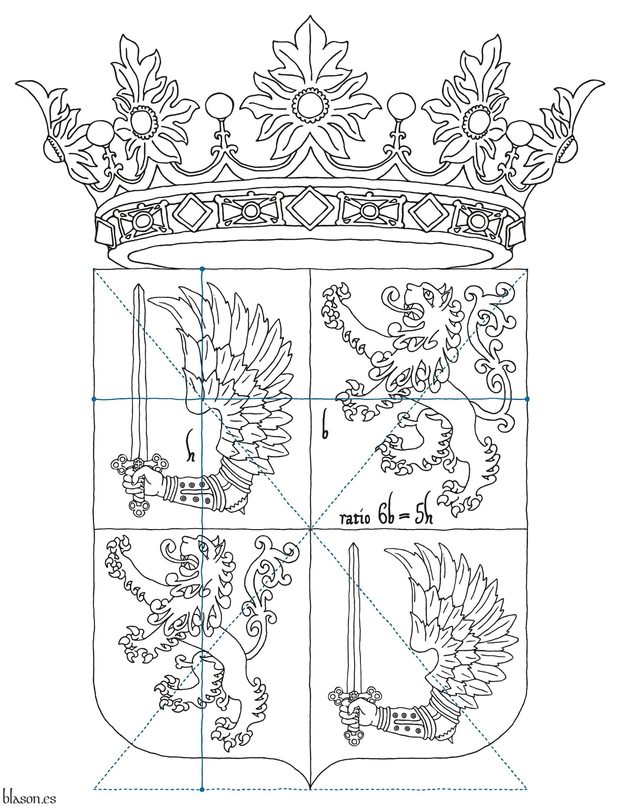
Quarterly: 1 and 4 Gules, a hand Carnation, embowed, vambraced and winged Or, holding a sword point upwards Argent, hilted Or; 2 and 3 Argent, a lion rampant Purpure, armed and langued Gules. Crest: An open royal crown.
Coat of arms of the Infante Manuel of Castile, 1234–1283, 7th son of the King Ferdinand III of Castile, 1199-1252, and the Queen Beatrice of Swabia, 1205–1235. This coat of arms has been delineated with proportions by me.
Blazon keywords: Gules, Or, Argent, Purpure, One, Quarterly, Hand, Arm, Vambraced, Embowed, Winged, Sword, Point upwards, Hilted, Lion, Rampant, Armed, Langued, Crest, Open royal crown and Crown.
Style keywords: Ratio, Outlined, Outlined in sable and Ogee.
Classification: Personal, Kingdom of Castile and Leon, Interpreted, Boa and Coat of arms.
Bearer: Manuel of Castile, Infante.


Ixai Lanzagorta Ochoa, schema 1x3
Argent, a chevron Sable and an ouroboros Azure, armed and langued Sable, interlaced.
The coat of arms of Ixai Lanzagorta Ochoa, designed by him, his father, Juan Lanzagorta Vallin, and me, and emblazoned by me in 3 steps: proportions, delineation, and plain colors and metal.
Credits: Juan Lanzagorta Vallin is the designer of the coat of arms.
Blazon keywords: Argent, Sable, Azure, One, Chevron, Ouroboros, Armed, Langued and Interlaced.
Style keywords: Ratio, Outlined, Outlined in sable, Plain tincture and Semi-circular.
Classification: Personal, Created, Schema, Boa and Coat of arms.
Bearer: Lanzagorta Ochoa, Ixai.


Jean-Christophe Loubet del Bayle, schema
Or, a wolf passant Gules; on a chief Gules, three bells Or. Crest: Upon a helm with a wreath Or and Gules, a demi-wolf Gules supporting with both paws an armillary sphere Or. Mantling: Gules doubled Or. Motto: «Varia vivendi cupidus».
The coat of arms of Jean-Christophe Loubet del Bayle designed by him emblazoned by me. The image shows the geometric structure used to arrange the heraldic elements in harmony.
Blazon keywords: Or, Gules, One, Three, Wolf, Passant, Chief, Bell, Crest, Upon (wreath), Helm, Wreath, Demi, Supporting, Paw, Armillary sphere, Mantling and Motto.
Style keywords: Ratio, Outlined in sable, Illuminated and Semi-circular.
Classification: Personal, Interpreted, Schema, Boa and Coat of arms.
Bearer: Loubet del Bayle, Jean-Christophe.


John Stuart, schema 2x3
Or, a fess chequey Argent, charged with an ermine spot, and Azure, between in chief two cross patty Gules, in base a thistle proper; a diminished bordure Azure.
The coat of arms of Reverend John Stuart, XVIII century, emblazoned by me in 3 approaches: 1) Classic bordure: Using a bordure with a width equal to 1/6 of the coat of arms' base. In the image, this is marked with texts and lines in Vert. Notice that the squares in columns 2 and 8 are split by the inner border of the bordure, which is unfortunate as it disrupts the design. 2) Diminished bordure: Using a narrower bordure with a width equal to 2/3 of the classic bordure, corresponding to 1 square of the fess chequey. In the image, this is marked with texts and lines in Gules. This approach avoids splitting any squares, allows for larger figures, and is my preferred solution. In England, diminished bordures, often simply blazoned as bordure, are more common than in Castile. 3) Without squares splitted: Retaining the classic bordure but shifting the fess chequey 1/2 square to either dexter or sinister to prevent splitting squares. However, this sacrifices the symmetry of the design. This last adjustment was used in the hatchment of Reverend John Stuart in St. George's Cathedral, Kingston, Ontario, 1785.
Blazon keywords: Or, Argent, Azure, One, Three, Nine, Two, Fess, Chequey, Charged, Ermine spot, Between, In chief, Cross, Patty, In base, Thistle, Proper and Diminished bordure.
Style keywords: Ratio, Outlined in sable, Illuminated, Semi-circular and Freehand.
Classification: Personal, Interpreted, Schema, Boa and Coat of arms.
Bearer: Stuart, John.


Juan Bautista Lanzagorta Escutia, schema 1x3
Azure, a chief wavy and barry wavy of twelve Azure and Argent debruised and interlaced by a fish urinant Argent.
Coat of arms of Juan Bautista Lanzagorta Escutia designed by Juan Lanzagorta Vallín and emblazoned by me. The image shows in 3 steps how I emblazoned it.
Blazon keywords: Azure, Argent, One, Twelve, Chief, Wavy, Barry, Debruised, Interlaced, Fish and Urinant.
Style keywords: Ratio, Outlined, Outlined in sable and Semi-circular.
Classification: Personal, Interpreted, Schema, Boa and Coat of arms.
Bearer: Lanzagorta Escutia, Juan Bautista.


Lineage Mark of Germany, schema 1x2
Or, a fess chequey Gules and Argent.
Coat of arms of the lineage Mark of Germany. Symmetrical geometry of a fess chequey of 3 traits: a) The height of the fess is 1/3 of the width of the coat of arms. b) The fess is chequey with 3 traits. c) Therefore, the height of each trait is calculated as 1/3 x 1/3 = 1/9 of the width of the coat of arms. d) In a square, the height is equal to the width. e) Consequently, the width of each square in the chequey is also 1/9 of the width of the coat of arms. f) The first trait must contain 9 squares, as the width of the fess allows for an exact division into 9 equal squares, 9 being an odd number. g) If the first square is Gules, the last square of the same row will also be Gules, ensuring symmetry in the design.
Blazon keywords: Or, Gules, Argent, One, Three, Nine, Fess and Chequey.
Style keywords: Ratio, Outlined, Outlined in sable, Plain tincture, Illuminated, Semi-circular and Freehand.
Classification: Personal, Lineage, Interpreted, Schema, Boa and Coat of arms.
Bearer: Mark of Germany, lineage.


Luis Gerardo Oyervides Ochoa, schema 2x2
Sable, a kapok tree eradicated and fructed between in base two lozenges Argent.
The coat of arms of Luis Gerardo Oyervides Ochoa, Mexico, designed and emblazoned by me in 4 steps: ratios, outlined, plain color and metal, and lights and shadows.
Blazon keywords: Sable, Argent, One, Two, Kapok tree, Tree, Eradicated, Fructed, Between, In base and Lozenge.
Style keywords: Ratio, Outlined, Outlined in sable, Plain tincture, Illuminated and Semi-circular.
Classification: Personal, Created, Schema, Boa and Coat of arms.
Bearer: Oyervides Ochoa, Luis Gerardo.


María de los Ángeles Carrillo Padilla, outlined
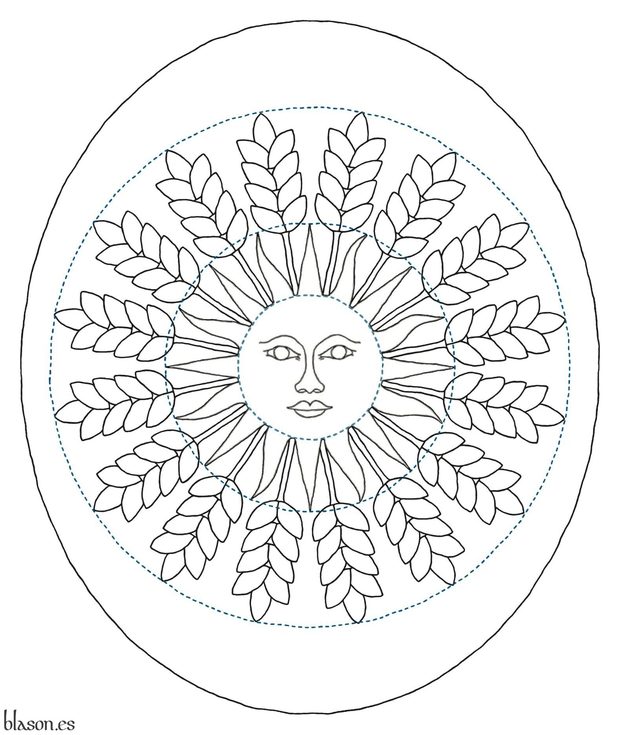
Azure, a sun in splendour, irradiated of sixteen ears of wheat Or.
This is the coat of arms of María de los Ángeles Carrillo Padilla. This coat of arms has been designed by her and her father-in-law Juan Lanzagorta Vallín, and outlined by me with an oval shape.
Blazon keywords: Azure, Or, One, Sixteen, Sun in splendour, Irradiated, Ear of wheat and Wheat.
Style keywords: Ratio, Outlined, Outlined in sable and Oval.
Classification: Personal, Interpreted, Boa and Coat of arms.
Bearer: Carrillo Padilla, María de los Ángeles.


Pesquera de Ebro, schema 3x3
Azure, on four bars wavy Argent a barbel bendwise Or and a three arch bridge Or, masoned Sable, throughout, supporting a elm couped Argent leaved Or, between, in dexter a tower Or, port and windows Azure, mazoned Sable, and in sinister three escutcheon Or, 2 and 1.
The coat of arms of Pesquera de Ebro, Burgos, Castile and Leon, designed and emblazoned by me by me in 9 steps. I have had the honor of participating in the project to create the coat of arms for Pesquera de Ebro. It has been a project carried out by the community in a dynamic and collaborative manner, facilitated through digital communication.
Design rationale
The inhabitants of Pesquera de Ebro form a very dynamic community and chose a series of elements to represent on their coat of arms, which, in order of importance, are the following: the elm tree, which stood in front of the church and served as a gathering point for the community; the three-arched bridge over the Ebro River; and the Ebro itself, which is part of the town's name. The word «pesquera», meaning a fishing spot, is symbolized by a barbel, a fish very common in the area, which I have depicted emerging from the water and placed bendwise. Additionally, the town features towers and a very high density of stone heraldic shields, one of the highest in Castile, hence the inclusion of the tower and the escutcheons.
Blazon keywords: Argent, Or, Azure, Sable, One, Three, On, Bar, Wavy, Barbel, Bendwise, Bridge, Masoned, Throughout, Upon, Elm, Couped (tree), Leaved, Tower, Port and windows, Escutcheon and Ordered.
Style keywords: Ratio, Outlined, Outlined in sable, Plain tincture, Illuminated and Semi-circular.
Classification: Civic, Created, Design rationale, Schema, Boa and Coat of arms.
Bearer: Pesquera de Ebro.


Pile issuant from the base in the Dictionary of the Spanish Language
Supporting document illustrating my proposal, pages 4 and 5.
I have made a suggestion to the Lexicography Institute of the Royal Spanish Academy regarding the heraldic term «pira» in the Dictionary of the Spanish Language. I drafted a document that justified my suggestion, illustrated it, and proposed two ways to refine its definition within the Dictionary. I am honored that they have accepted my proposal and chosen the first of the alternative definitions I suggested. The following images are some of those I used to illustrate the supporting document.
Schema.
Delineation.
Coats of arms of the Burr, Osona, Gangoiti and Egado lineages.
I used the following bibliographical references [Académie internationale d'héraldique; 1952], [Arco y García, F. del; 1996a], [Avilés, J.; 1725a], [Avilés, J.; 1780a], [Cadenas y Vicent, V. de; 1987], [Cadenas y Vicent, V. de; 1975], [Cadenas y Vicent, V. de; 2002], [Messía de la Cerda y Pita, L.; 1990], and [Messía de la Cerda y Pita, L.; 1980].
Categories: Schema, Ratio, Outlined, Outlined in sable, Illuminated, Semi-circular and Doctor.


Proportion of the mullet of Itziar Lanzagorta Ochoa
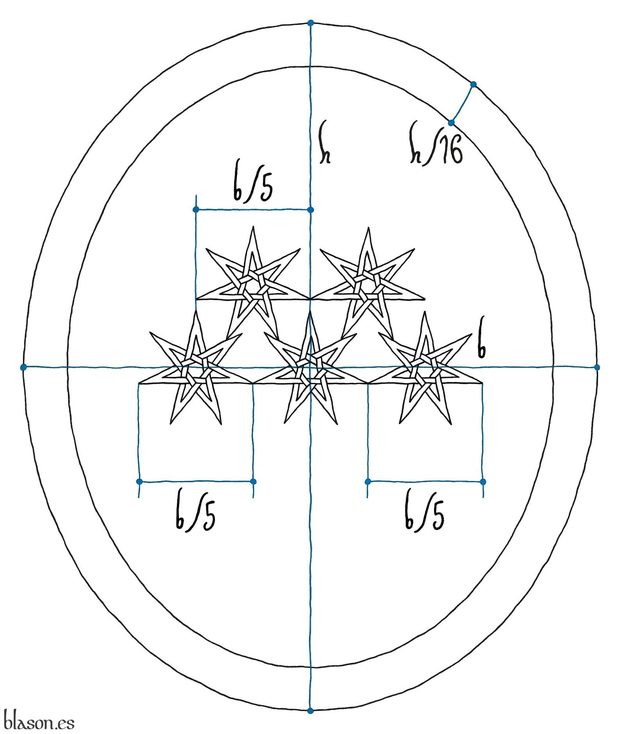
Azure semé of mullets of seven points voided, interlaced, and conjoined Argent; a bordure Argent.
The coat of arms of Itziar Lanzagorta Ochoa designed by her and her father Juan Lanzagorta Vallín. This drawing corresponds to the initial phase of the delineation, in which the relative dimensions are established: the size of the mullets in relation to the coat of arms width b, and the width of the bordure in relation to the overall height h of the coat of arms. The outline has been drawn by me in an oval shape.
Blazon keywords: Argent, Azure, One, Semé, Mullet, Voided, Interlaced and Conjoined.
Style keywords: Ratio, Outlined and Oval.
Classification: Personal, Interpreted, Boa and Coat of arms.
Bearer: Itziar Lanzagorta Ochoa.


Proportional scheme for the arms of the Kingdom of Spain
Quarterly: 1 Gules, a castle triple-towered Or, port and windows Azure, masoned Sable [for Castile]; 2 Argent, a lion rampant Purpure, armed and langued Gules, crowned Or [for Leon]; 3 Or, four pallets Gules [for Aragon]; 4 Gules, a chain orlewise, crosswise, and saltirewise Or, charged in the fess point with an emerald Vert [for Navarre]; enté en point Argent, a pomegranate proper, seeded Gules, slipped and leaved Vert [for Granada]; an inescutcheon Azure, three fleurs de lis Or, 2 and 1, a bordure Gules [for Bourbon].
The figure illustrates my construction scheme outlined with my main proportions for the coat of arms of the Kingdom of Spain. The scheme is conceptually divided into three horizontal rectangles of equal height: the first one dedicated to the Royal Crown, the second to the quarters of Castile and and Leon, and the third rectangle to the quarters of Aragon and Navarre. The width of the central inescutcheon is defined as 1/3 of the total shield width. The curve of the enté en point of Granada is designed such that the resulting shapes in the quarter for Aragon and the quarter for Navarre are symmetrical, evoking the form of a pointed shield.
Blazon keywords: Gules, Azure, Purpure, Vert, Or, Argent, One, Three, Four, Quarterly, Castle, Triple-towered, Port and windows, Masoned, Lion, Rampant, Crowned, Pallet, Chain, Orlewise, Crosswise, Saltirewise, Charged, In the fess point, Emerald, Enté en point, Pomegranate, Proper, Slipped, Leaved, Inescutcheon, Fleur de lis, Ordered and Bordure.
Style keywords: Ratio, Outlined, Outlined in sable, Illuminated and Semi-circular.
Classification: Civic, Kingdom of Spain, Interpreted, Schema, Boa and Coat of arms.
Bearer: Spain, Kingdom of.


Schema of the genealogical chart of the House of Potts of Wentworth
This is a structural diagram composed of four rows and nine columns, where the coats of arms are positioned at the vertices of a grid of equilateral triangles. The side of each triangle is 4/3 the height of the coat of arms. This geometric framework allows for the creation of a symmetrical genealogical chart with the coats of arms of the House of Potts of Wentworth.
Style keywords: Ratio, Outlined and Semi-circular.
Classification: Personal, Interpreted, Schema, Boa, Family tree and Genealogical.
Bearer: Potts of Wentworth, House of.


Sean Shriner, schema 2x2
Argent, flanched Gules crusilly of cross-crosslets Argent, overall a bear rampant regardant Sable, armed and langued Azure, charged with a key and a sword in saltire Argent, hilted Or, the key debruised by the sword.
Coat of arms of Sean Shriner, designed by The Armorial Register, and revised and emblazoned by me. Image showing the different steps, delineations, and proportions used in the creation of it.
Blazon keywords: Argent, Gules, Sable, Azure, Or, One, Flanched, Semé, Cross-crosslet, Cross couped, Overall, Bear, Rampant, Regardant, Armed, Langued, Charged, Key, Sword, In saltire, Hilted and Debruised.
Style keywords: Ratio, Outlined, Outlined in sable, Plain tincture and Pointed.
Classification: Personal, Interpreted, Schema, Boa and Coat of arms.
Bearer: Shriner, Sean.


Sister Esperanza Vega Lanzagorta, schema 2x2
Azure, between two palm fronds in pile reversed a Lady of Mercy grasping in her sinister hand a broken chain Argent, and charged on the chest with an escutcheon per fess, 1 Gules, a cross patty Argent, and 2 Or, four pallets Gules.
This is the coat of arms of Sister Esperanza Vega Lanzagorta, designed by Juan Lanzagorta Vallin and painted by me in 2 steps. In the 1st row is the selected version of her coat of arms, and in the 2nd row is an alternative version; both are based on the same structure and concepts. The blazon for the alternative version is as follows, note that the only change is the arrangement of the two palm fronds, from pile reversed to pile: «Azure, between two palm fronds in pile a Lady of Mercy grasping in her sinister hand a broken chain Argent, and charged on the chest with an escutcheon per fess, 1 Gules, a cross patty Argent, and 2 Or, four pallets Gules».
Credits: Juan Lanzagorta Vallin is the designer of the coat of arms.
Blazon keywords: Azure, Argent, Gules, Or, One, Two, Our Lady of Mercy, Grasping, Sinister, Hand, Broken, Chain, Charged, Chest, Escutcheon, Party per fess, Cross patty, Cross couped, Between, Palm frond, In pile reversed and In pile.
Style keywords: Ratio, Outlined, Outlined in sable, Plain tincture, Illuminated and Semi-circular.
Classification: Personal, Created, Schema, Boa and Coat of arms.
Bearer: Vega Lanzagorta, Sister Esperanza.


Tercio Alessandro Farnese, schema 3x3
Azure, a cross of Burgundy Or; an inescutcheon Or, six fleurs de lis in orle Azure.
Coat of arms of the Tercio Alessandro Farnese, 4th of the Spanish Legion, emblazoned by me in 9 steps. Because «1/3» ~ «one third» ~ «un tercio», and the height and witdh of the inescutcheon is 1/3 of its coat of arms, I use these arms to show a geometric method to calculate it. The inescutcheon has in orle the six fleurs the lis of the Farnese family.
Blazon keywords: Azure, Or, One, Six, Cross of Burgundy, Cross couped, Inescutcheon, Fleur de lis and In orle.
Style keywords: Ratio, Outlined, Outlined in sable, Plain tincture, Illuminated and Semi-circular.
Classification: Military, Interpreted, Schema, Boa and Coat of arms.
Bearer: Tercio Alessandro Farnese.


Tercio Great Captain, schema 3x4
Gules, a cross of Burgundy Or; an inescutcheon Or, three bars Gules.
Coat of arms of the Tercio Great Captain, 1st of the Spanish Legion, emblazoned by me in 12 steps. The inescutcheon represents the coat of arms of Gonzalo Fernandez de Cordoba, 1453-1515, «The Great Captain». To paint the coat of arms of the Tercio Gran Capitán, I applied a geometric method that involves dividing both the width and the height of the shield into three equal parts. This way, the central inescutcheon, bearing the arms of Gonzalo Fernandez de Cordoba, occupies exactly one third of the width and one third of the height of the main shield. Beyond its compositional function, this method also serves as a symbolic nod to the name of this historic military unit. The shield of the Tercio has been quite literally built using thirds. It is a small play on words and shapes that combines geometry with heraldic tradition.
Blazon keywords: Gules, Or, One, Three, Cross of Burgundy, Cross couped, Inescutcheon, Bar and Fess.
Style keywords: Ratio, Outlined, Outlined in sable, Plain tincture, Illuminated and Semi-circular.
Classification: Military, Interpreted, Schema, Boa and Coat of arms.
Bearer: Tercio Great Captain.


Teresa Otxoa Magaña, schema 1x3
Azure, in chief a moon with human face Argent, in base a crescent chequey Sable and Argent; overall a she-wolf ululant, sejant on the crescent proper, armed and the udders Gules.
The coat of arms of Teresa Otxoa Magaña designed by her and her husband Juan Lanzagorta Vallín, and emblazoned by me with an oval shape in 3 steps: ratios, outlined, and tinctures.
Blazon keywords: Azure, Argent, Sable, Gules, One, Chief, Moon, With human face, Base, Crescent, Chequey, Overall, She-wolf, Ululant, Sejant, Proper, Armed and Udder.
Style keywords: Ratio, Outlined, Outlined in sable, Plain tincture and Oval.
Classification: Personal, Interpreted, Schema, Boa and Coat of arms.
Bearer: Otxoa Magaña, Teresa.
-
Language
-
Categories of heraldry
-
Divisions of the field
- Without divisions
- Party per pale
- Party per fess
- Party per bend
- Party per bend sinister
- Tierce
- Tierce sinister
- Tierced per pale
- Tierced per fess
- Tierced per bend
- Tierced pallwise inverted
- Quarterly
- Quarterly per saltire
- Gyronny
- Party per fess, the chief per pale
- Party per pale, the sinister per fess
- Party per fess, the base per pale
- Party per pale, the dexter per fess
- Chapé
- Chaussé
- Embrassé
- Contre-embrassé
- Party per chevron
- Enté
- Enté en point
- Flanched
-
Metals
-
Colours
-
Furs
-
Other tinctures
-
Ordinaries and sub-ordinaries
-
Diminutives of the ordinaries
-
Geometric charges
-
Composite ordinaries
-
Inanimate charges from Nature
Atom, Crescent, Diamond, Emerald, Estoile, Increscent, Lightning flash, Moon, Mount, Mullet, Mullet of four points, Orbital, Plough of Ursa Major, Rainbow, Ray of the sun, River, Sea, Snowflake, Sun, Sun in splendour, Sun of May, Trimount, Water and Wave.
-
Vegetal charges from Nature
Acorn, Apple, Apple tree, Ash, Bluebonnet, Camellia, Chrysanthemum, Cinquefoil, Cornflower, Dogwood flower, Double rose, Eguzki-lore, Elm, Fleur de lis, Flower, Gourd, Holm oak, Hop cone, Indian paintbrush, Kapok tree, Laurel, Lily, Linden, Lotus flower, Madonna lily, Mexican cedar tree, Oak, Olive tree, Palm tree, Plantain plant, Pomegranate, Poplar leaf, Rose, Shamrock, Sunflower, Thistle, Tree, Tulip, Vine and Wheat.
-
Animal charges from Nature
Badger, Bald eagle, Barbel, Barn owl, Bear, Beaver, Bee, Beetle, Bighorn sheep, Binson, Blackbird, Boar, Brach hound, Bull, Doe, Dog, Dolphin, Dove, Eagle, Elephant, Falcon, Female figure, Fish, Flame, Fly, Fox, Frog, Goat, Goldfinch, Goose, Heron, Horse, Hummingbird, Jaguar, Lark, Leopard, Lion, Lion passant, Lion rampant guardant, Lioness, Lynx, Male figure, Martlet, Merino ram, Owl, Panther, Parrot, Peacock, Pelican, Pelican in her piety, Pronghorn, Puffin, Quetzal, Raven, Roe deer, Rooster, Savage, Seagull, Serpent, She-wolf, Stag, Starling, Talbot, Turtle, Tyger, Vulture, Warren hound and Wolf.
-
Parts of natural charges
Arm, Beak, Branch, Caboshed, Chest, Claw, Covert, Dorsal fin, Eagle claw, Ear of wheat, Ermine spot, Escallop, Feather, Foot (palmiped), Foreleg, Forepaw, Hand, Head, Heart, Hoof, Leaf, Neck, Ostrich feather, Palm frond, Paw, Roe deers' attires, Shoulder, Sprig, Stags' attires, Stem, Swallow-tail, Tail, Tail addorsed, Tail fin, Talon, Tibia, Tooth, Trunk, Trunk (elephant), Two hands clasped, Two wings in vol, Udder, Wing and Wrist.
-
Artificial charges
Ace of spades, Anchor, Anvil, Arch, Arm vambraced, Armillary sphere, Arrow, Axe, Bell, Bell tower, Beret, Bonfire, Book, Bookmark, Bow, Branding iron, Bridge, Broken, Buckle, Cannon, Cannon dismounted, Cannon port, Canopy roof, Carbuncle, Castle, Celtic Trinity knot, Chain, Chess rooks, Church, Clarion, Clay pot, Closed book, Club, Column, Comb, Compass rose, Conductor's baton, Cord, Covered cup, Crozier, Crucible, Cuffed, Cup, Cyclamor, Dagger, Displayed scroll, Double vajra, Drum, Ecclesiastical cap, Fanon, Federschwert, Fleam, Four crescents joined millsailwise, Galician granary, Garb, Gauntlet, Geometric solid, Grenade, Halberd, Hammer, Harp, Host, Hourglass, Key, Key ward, Knight, Knot, Lantern, Letter, Line, Loincloth, Maunch, Menorah, Millrind, Millstone, Millwheel, Monstrance, Mortar, Mullet of six points pierced, Nail, Non-classic artifact, Norman ship, Number, Oar, Oil lamp, Open book, Page, Pair of pliers, Pair of scales, Parchment, Pestle, Piano, Pilgrim's staff, Plough share, Polish winged hussar, Port, Portcullis, Potent, Quill, Ribbon, Rosette of acanthus leaves, Sabre, Sackbut, Sail, Scroll, Scythe, Sheaf of tobacco, Ship, Skirt, Spear, Spear's head, Stairway, Star of David, Step, Sword, Symbol, Tetrahedron, Torch, Tower, Trident, Trumpet, Turret, Two-handed sword, Wagon-wheel, Water-bouget, Wheel, Winnowing fan and With a turret.
-
Immaterial charges
Angel, Archangel, Basilisk, Dragon, Dragon's head, Garuda, Golden fleece, Griffin, Heart enflamed, Justice, Mermaid, Our Lady of Mercy, Ouroboros, Paschal lamb, Pegasus, Phoenix, Sacred Heart of Jesus, Saint George, Sea-griffin, Trinity, Triton, Unicorn, Winged hand and Wyvern.
-
External elements
-
Heraldic creations
-
References
-
Formats
-
Keywords on this page
Port and windows, Between, Chequey, Proper, Pointed, Armed, Azure, Boa, Bordure, Overall, Bar, Wreath, Chain, Charged, Castle, Upon (wreath), Crest, Crowned, Created, Cross couped, Four, Outlined, Outlined in sable, Two, In base, Coat of arms, Inescutcheon, Schema, Fess, Fleur de lis, Personal, Gules, Illuminated, Interpreted, Chief, Lion, Masoned, Semi-circular, Military, Or, Argent, Ratio, Purpure, Rampant, Sable, Plain tincture, Freehand, Three and One.

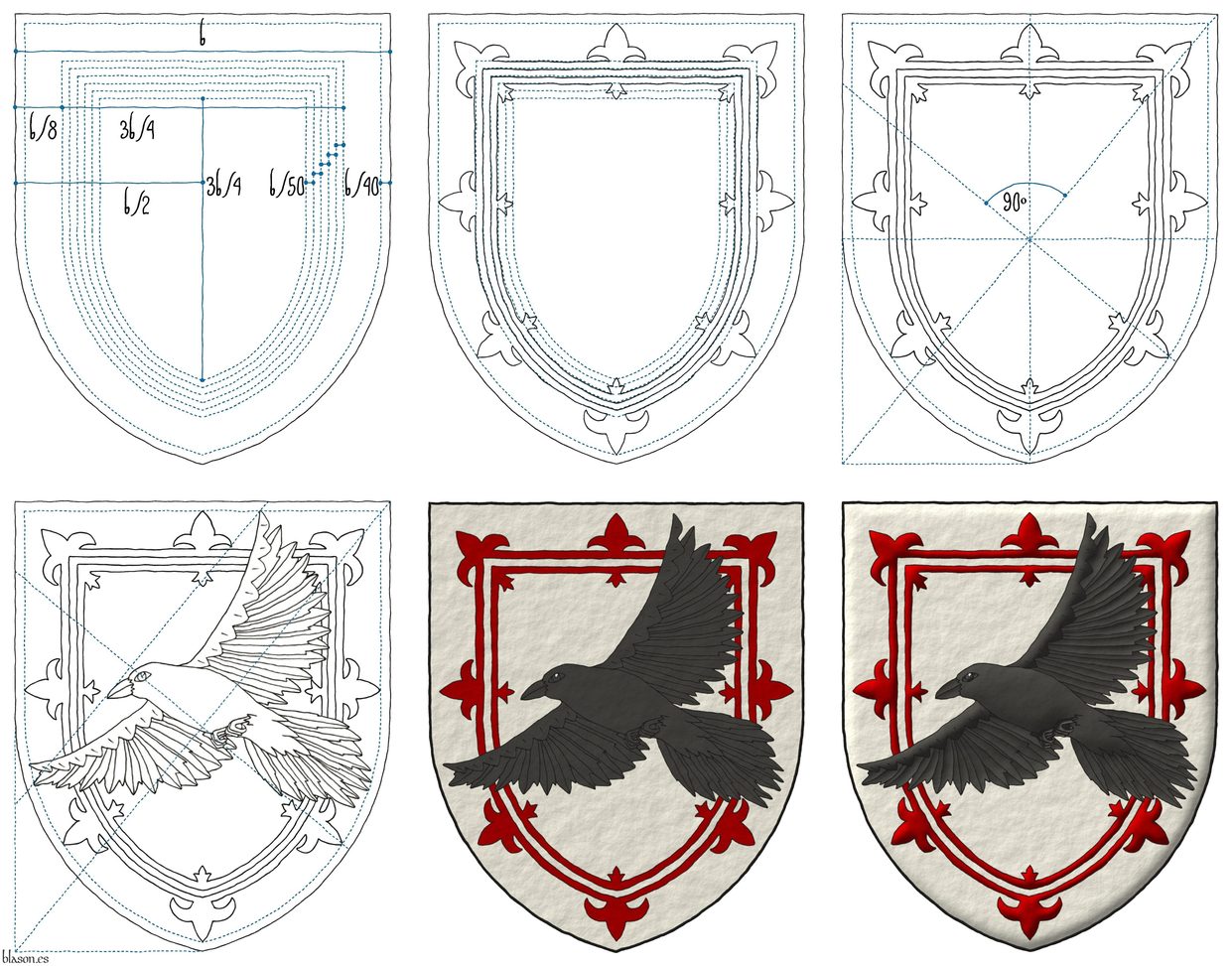
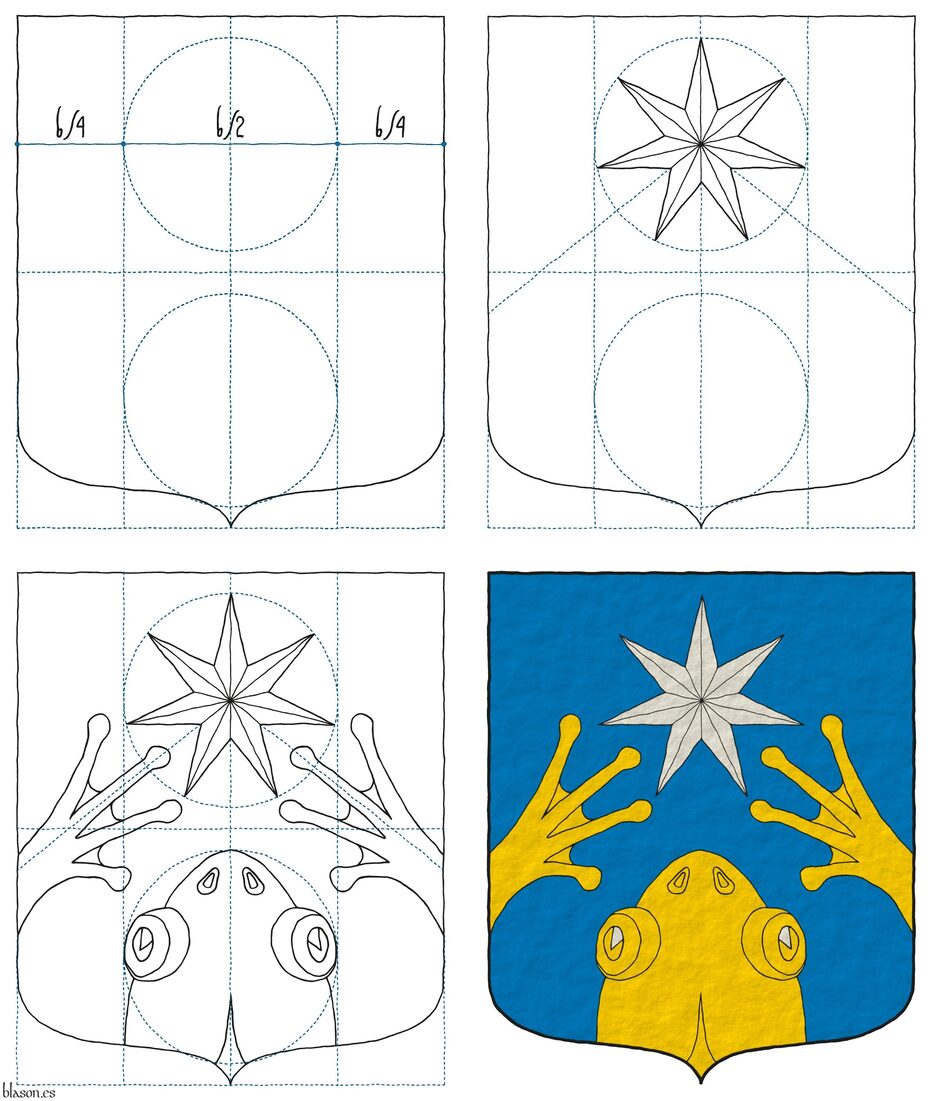
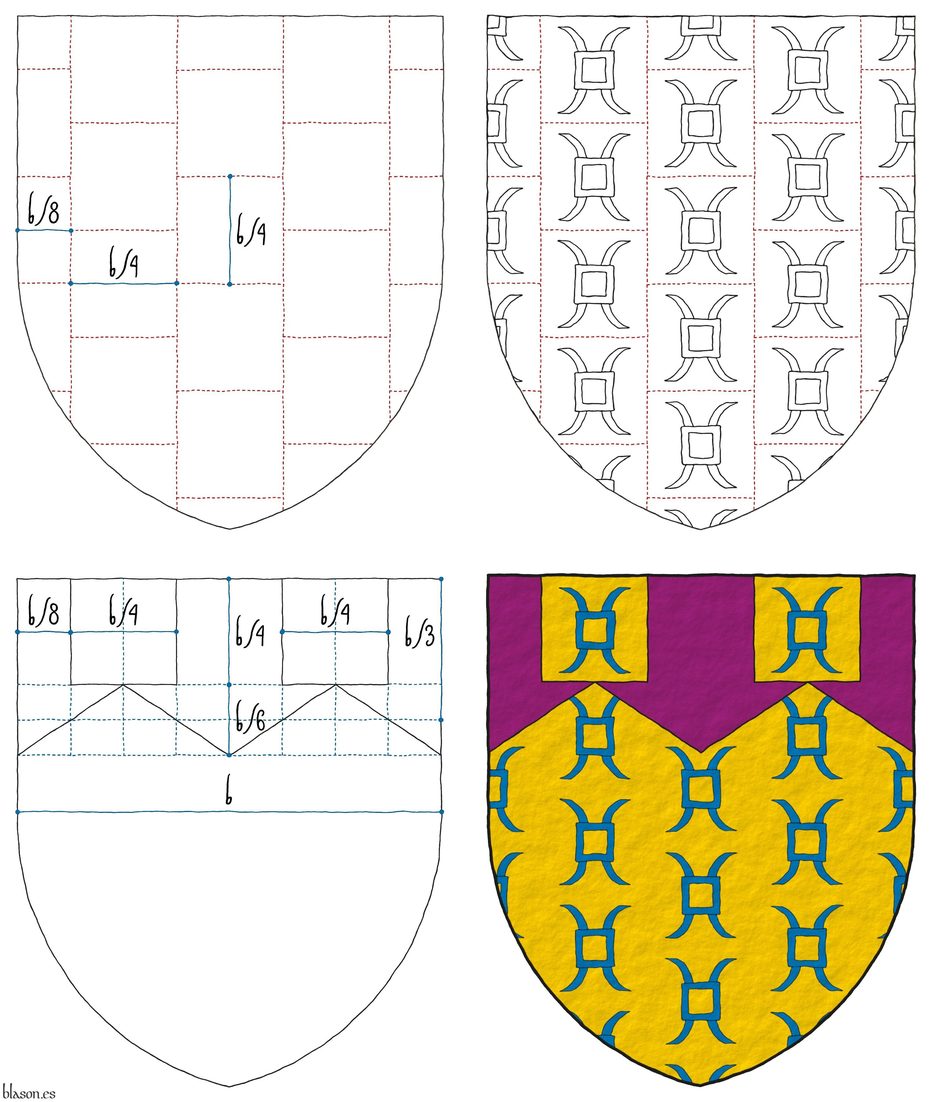
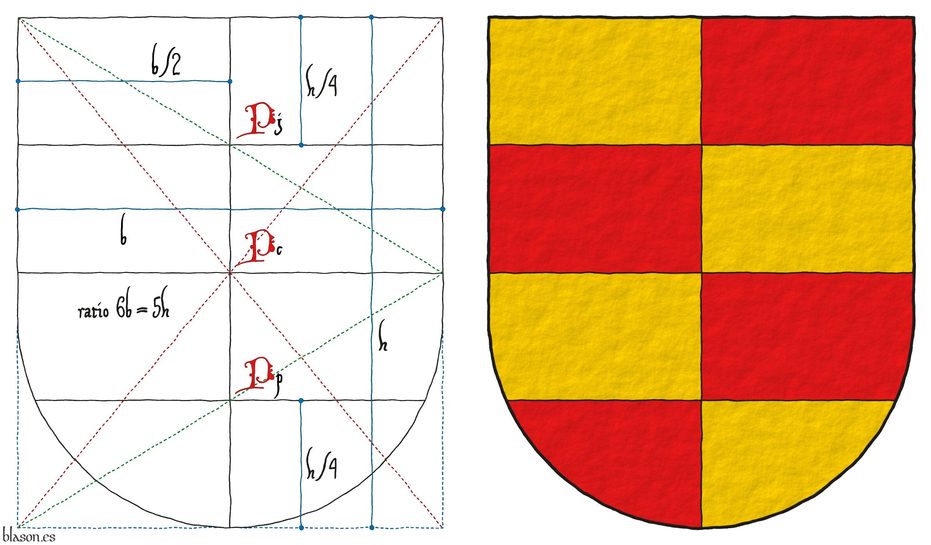
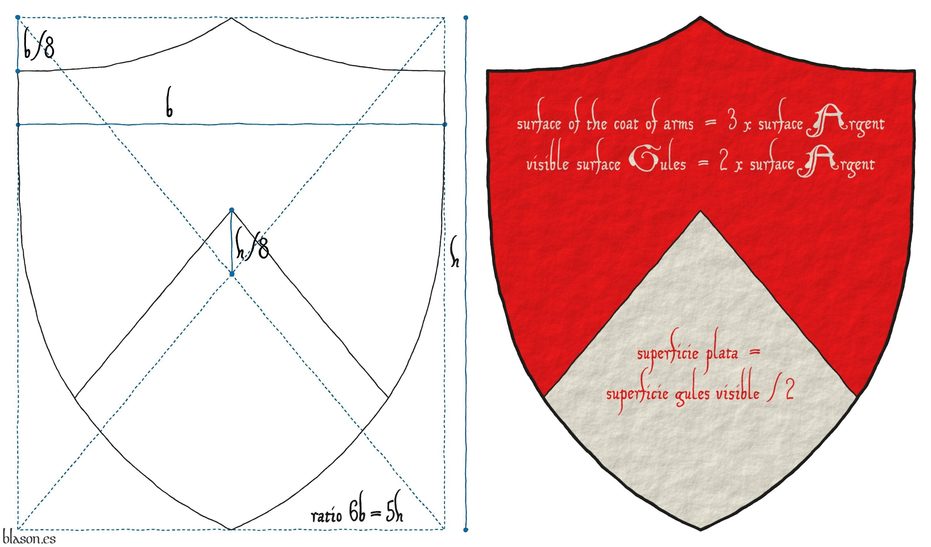
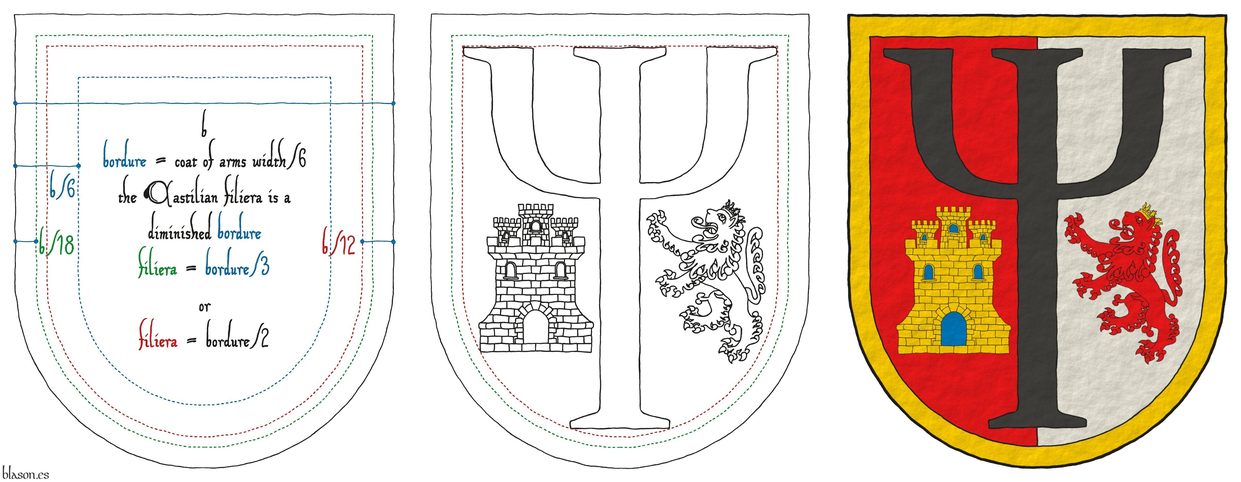
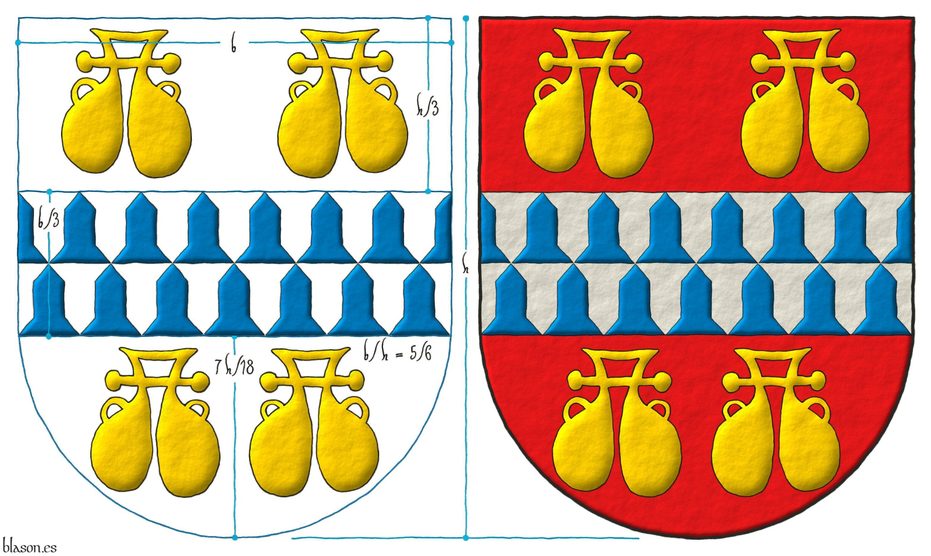
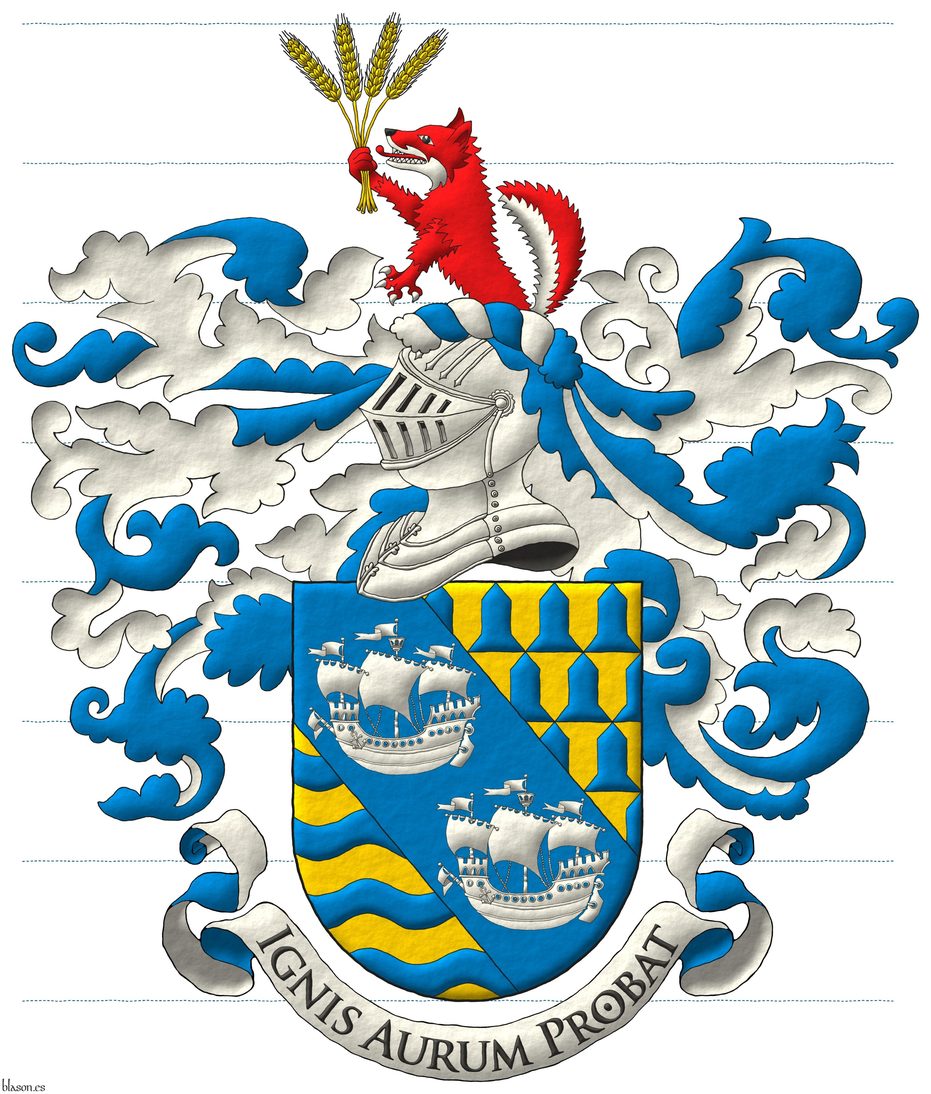
![Felipe VI of Spain and the golden number Quarterly: 1 Gules, a castle triple-towered Or, port and windows Azure, masoned Sable [for Castile]; 2 Argent, a lion rampant Purpure, armed and langued Gules, crowned Or [for Leon]; 3 Or, four pallets Gules [for Aragon]; 4 Gules, a chain orlewise, crosswise, and saltirewise Or, charged in the fess point with an emerald Vert [for Navarre]; enté en point Argent, a pomegranate proper, seeded Gules, slipped and leaved Vert [for Granada]; an inescutcheon Azure, three fleurs de lis Or, 2 and 1, a bordure Gules [for Bourbon]. Crest: A closed royal crown. The shield is surrounded by the Golden Fleece.](../escudo_armas/FelipeVI.13.Aurea.Dimensiones.Esquema.1x3.jpg)
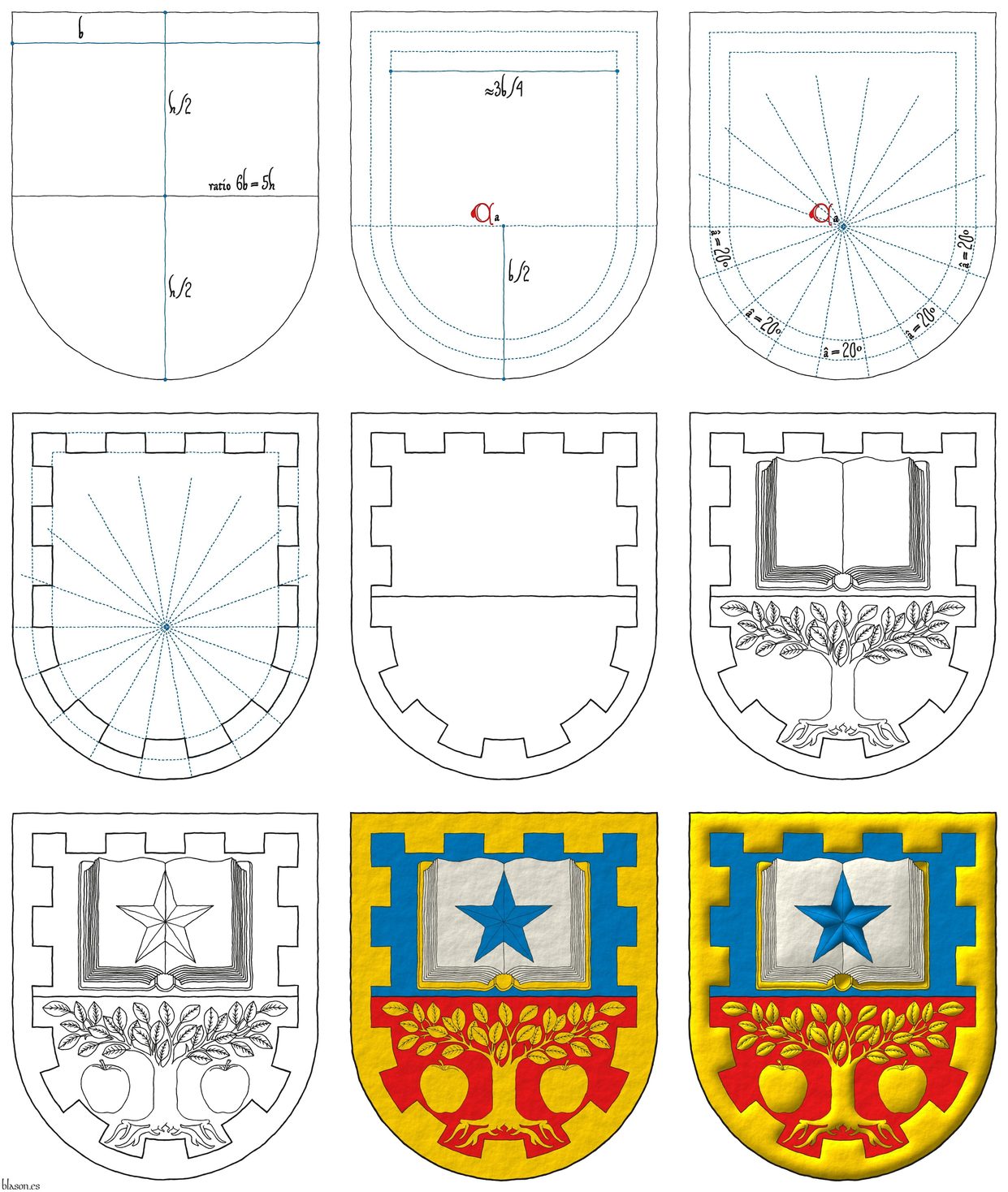
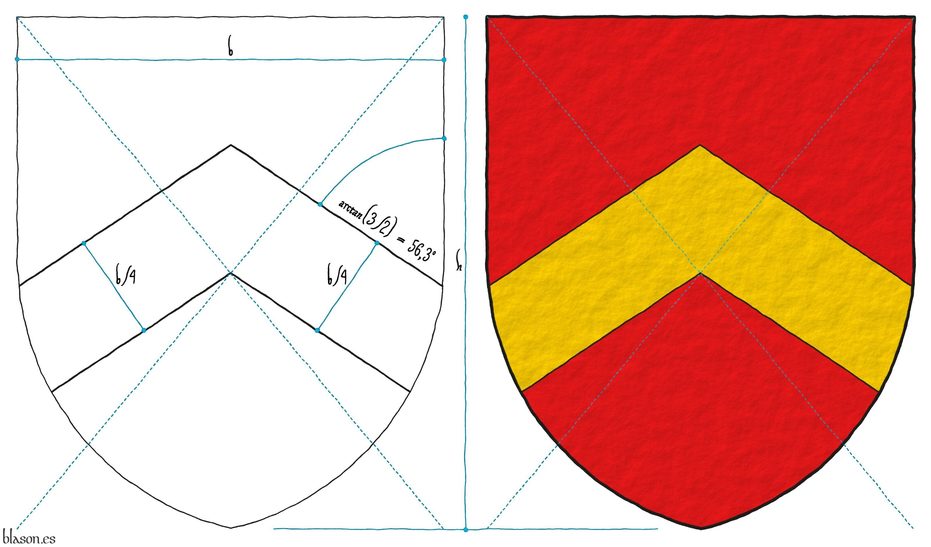
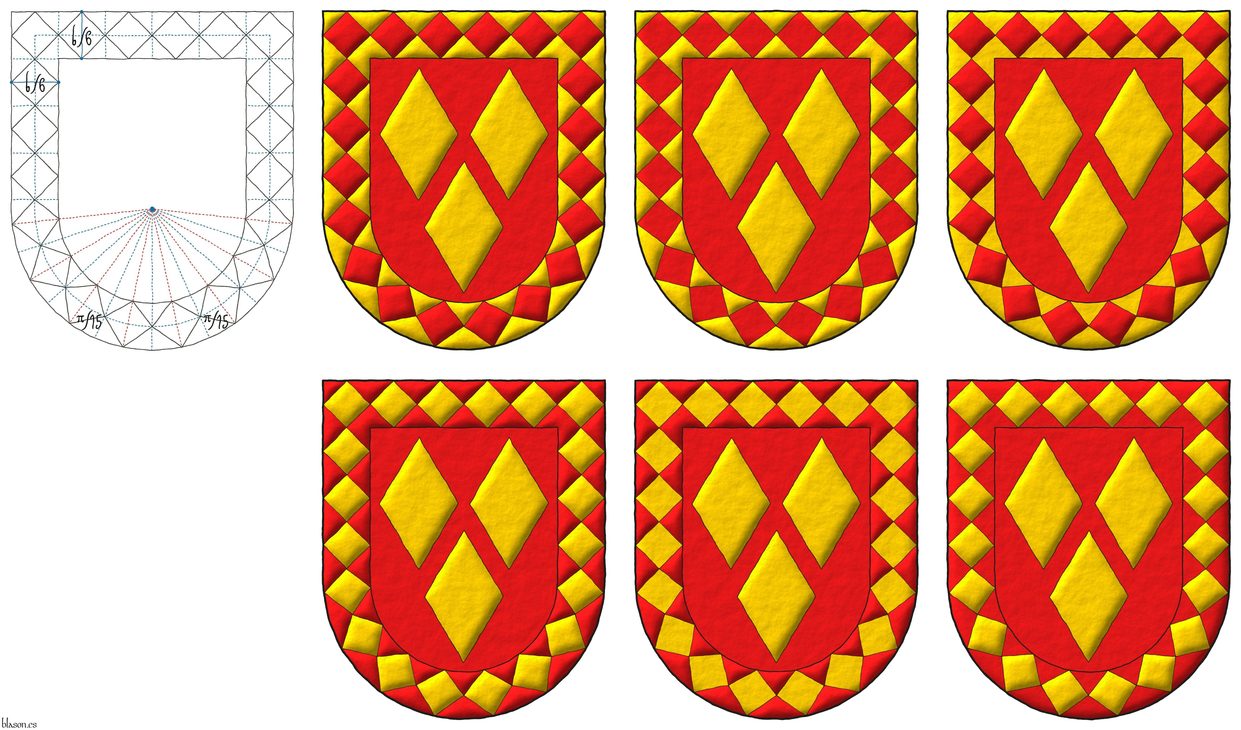
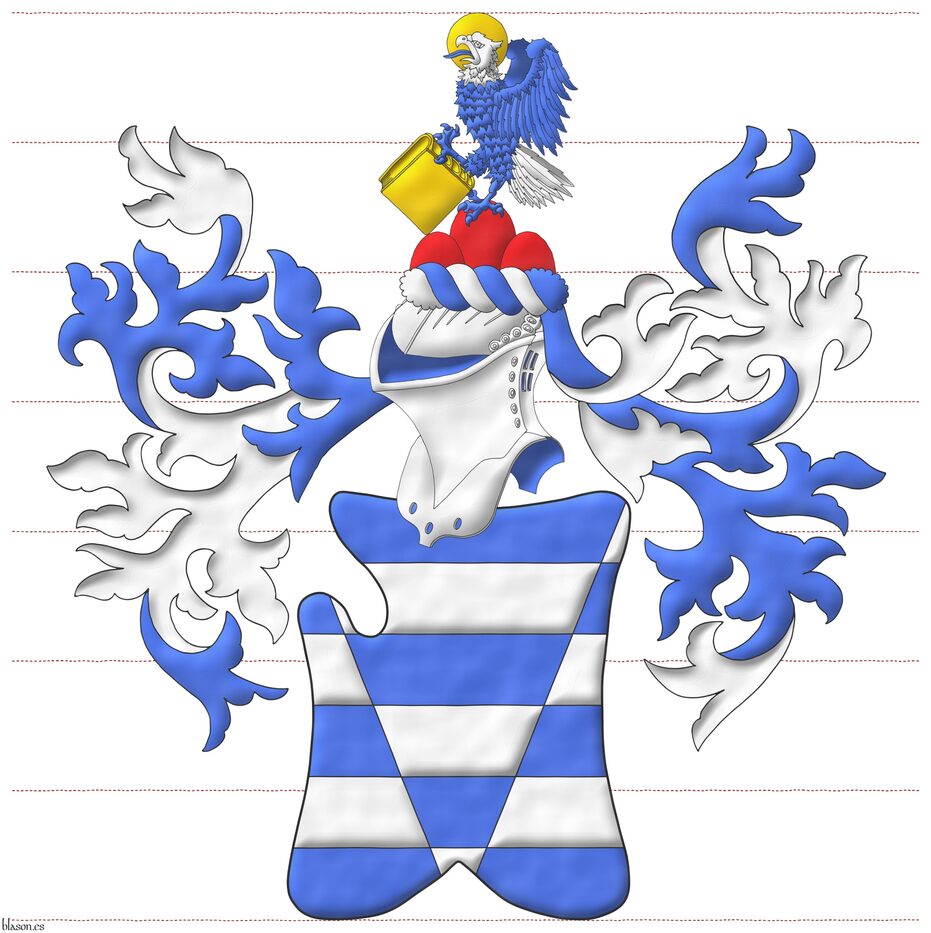
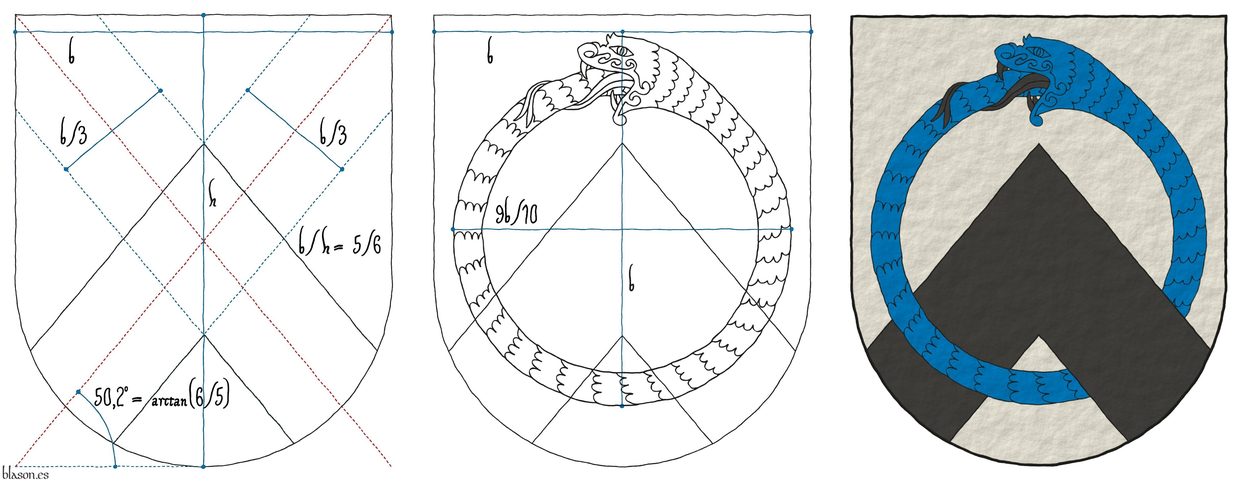
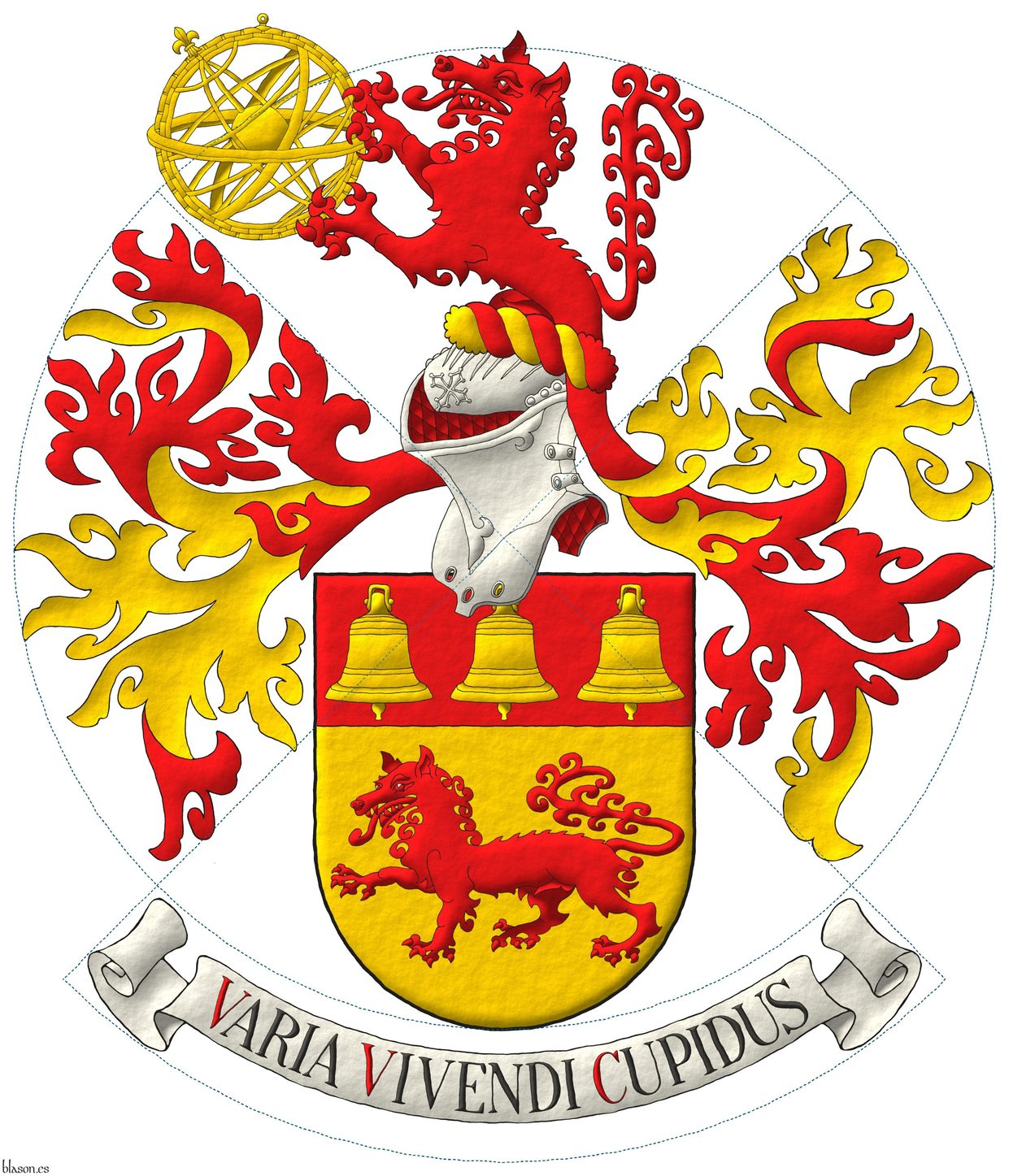
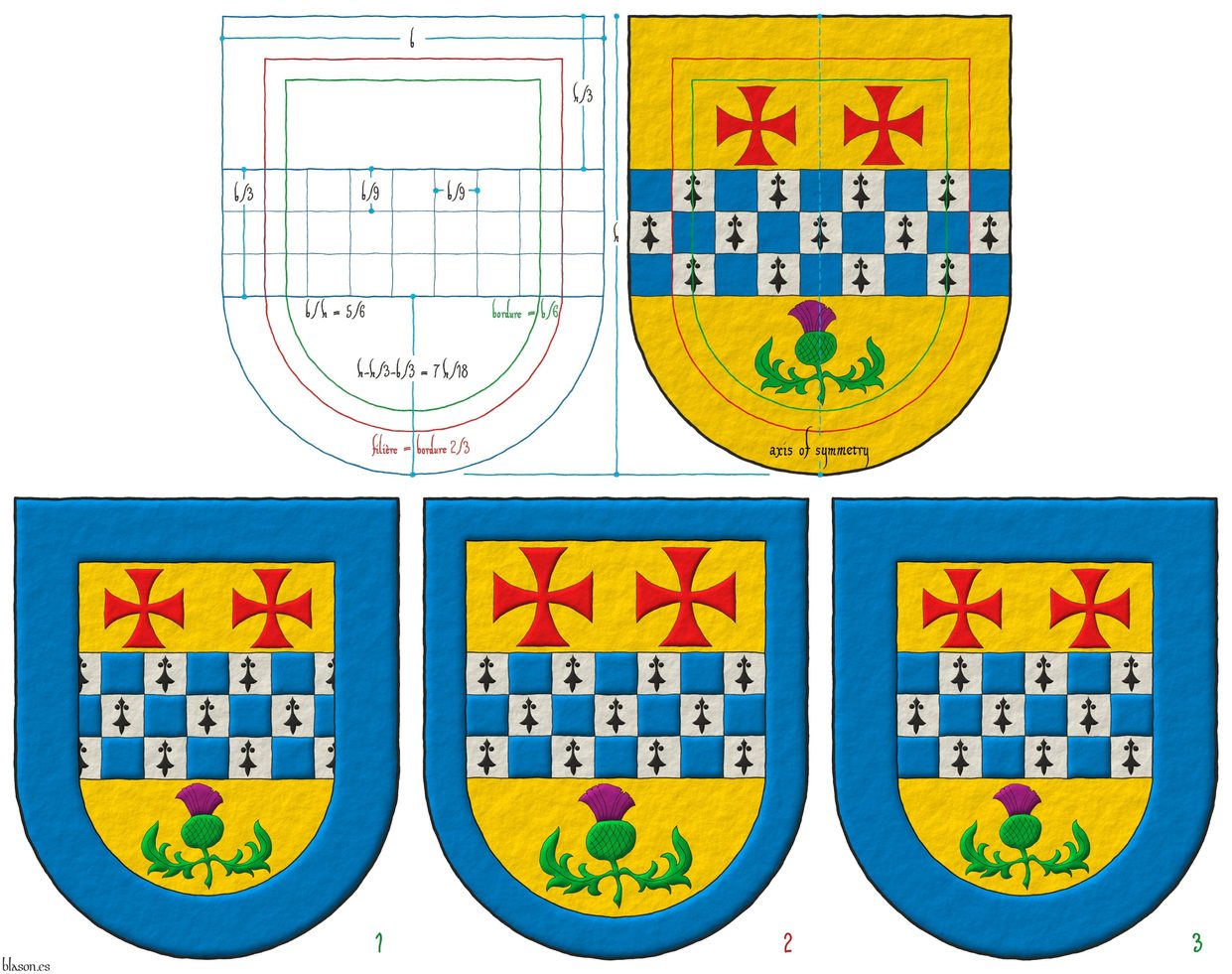
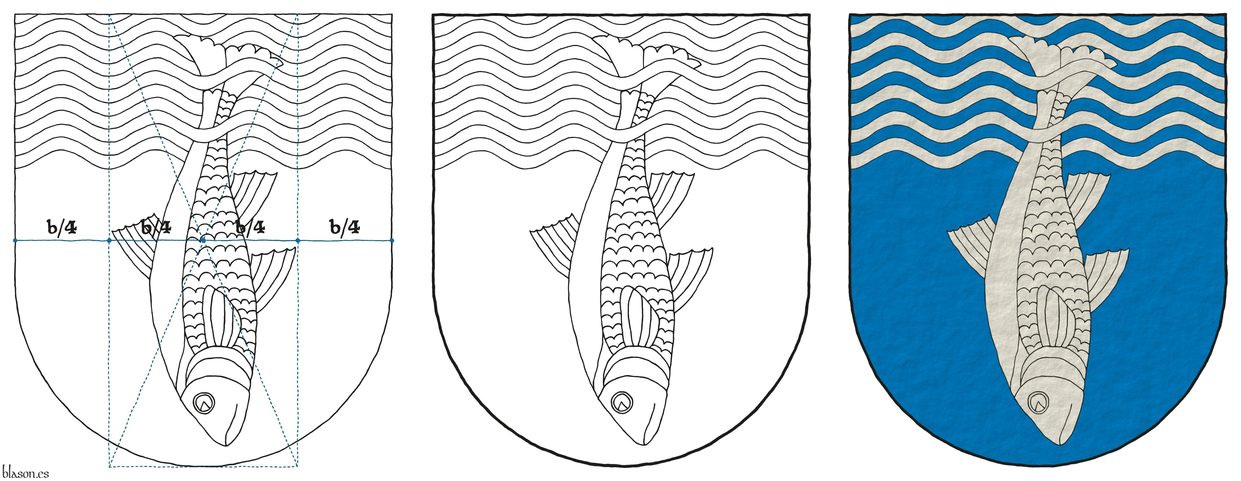
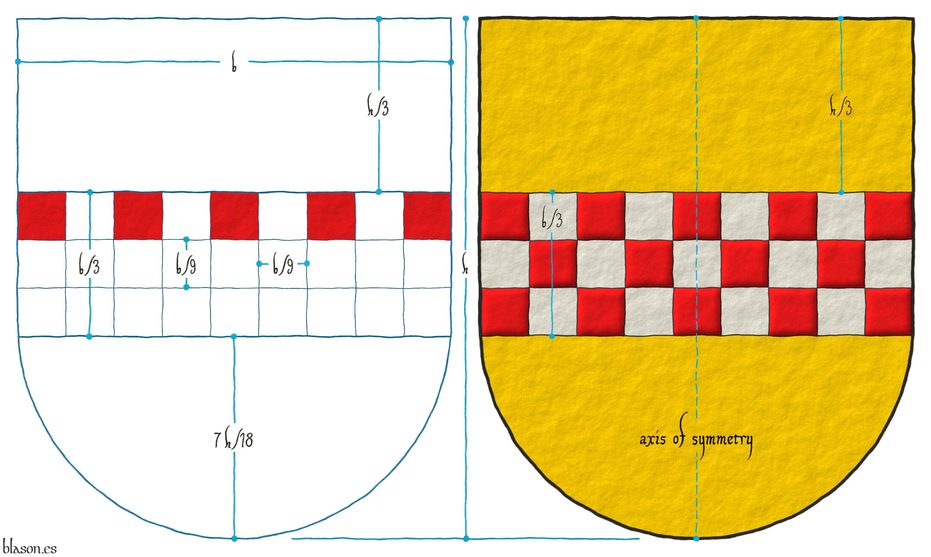
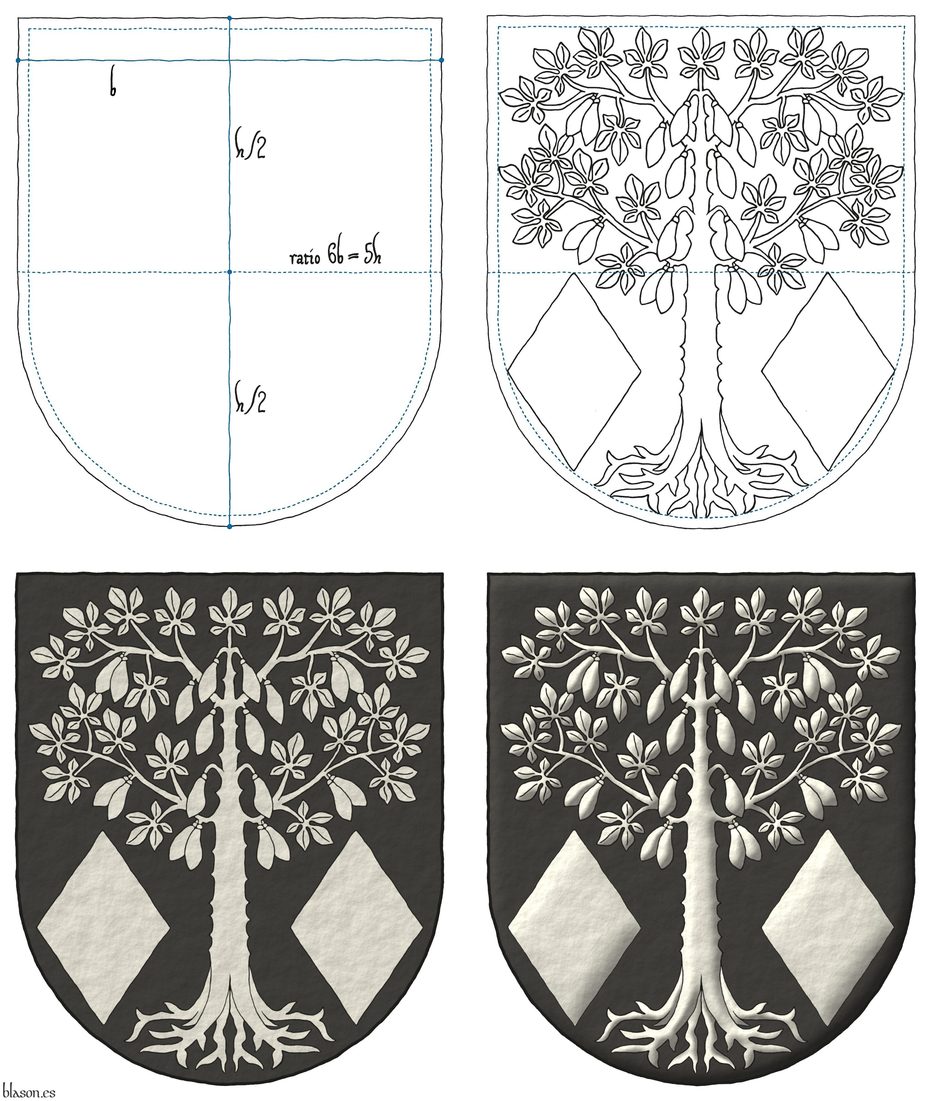
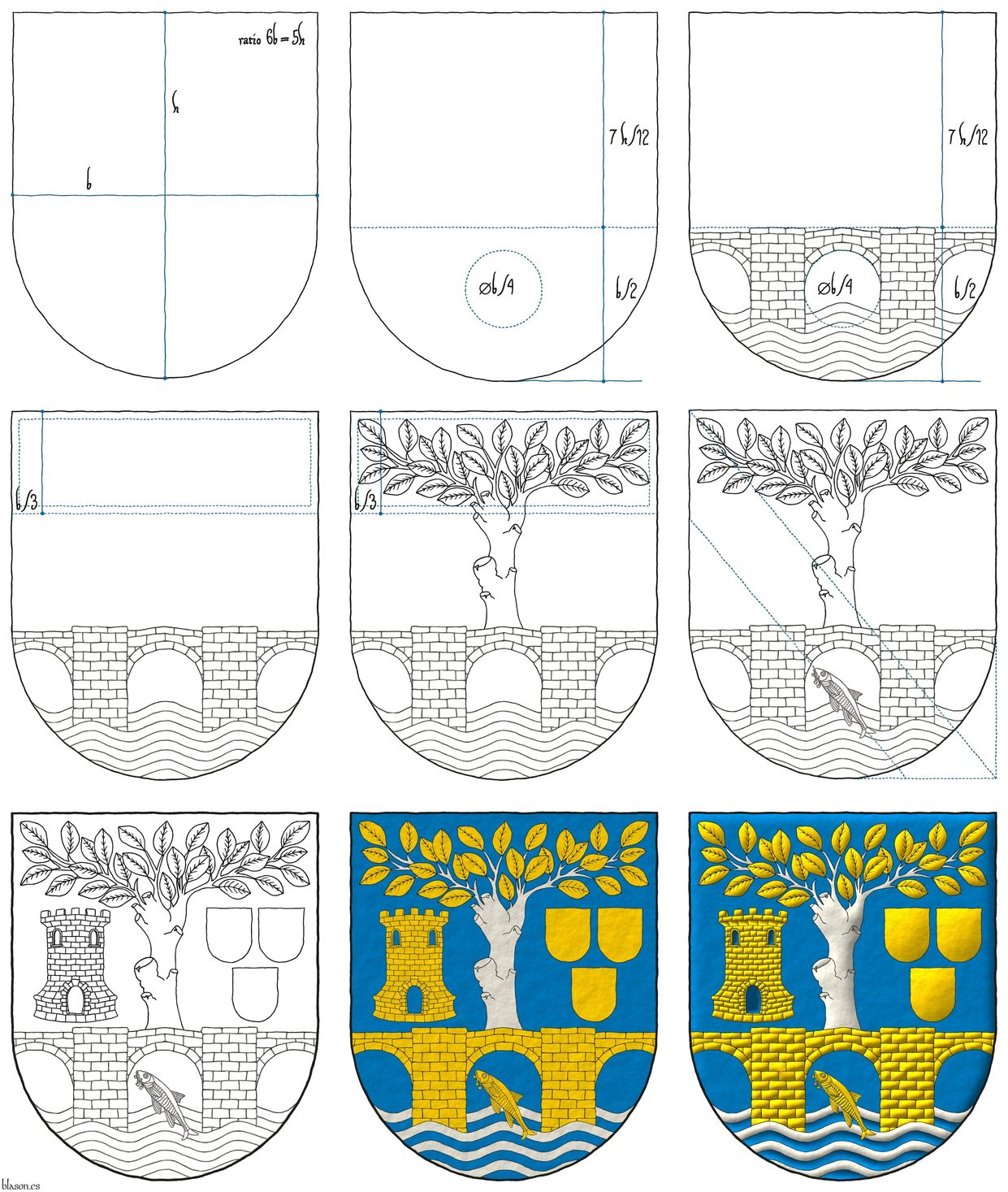
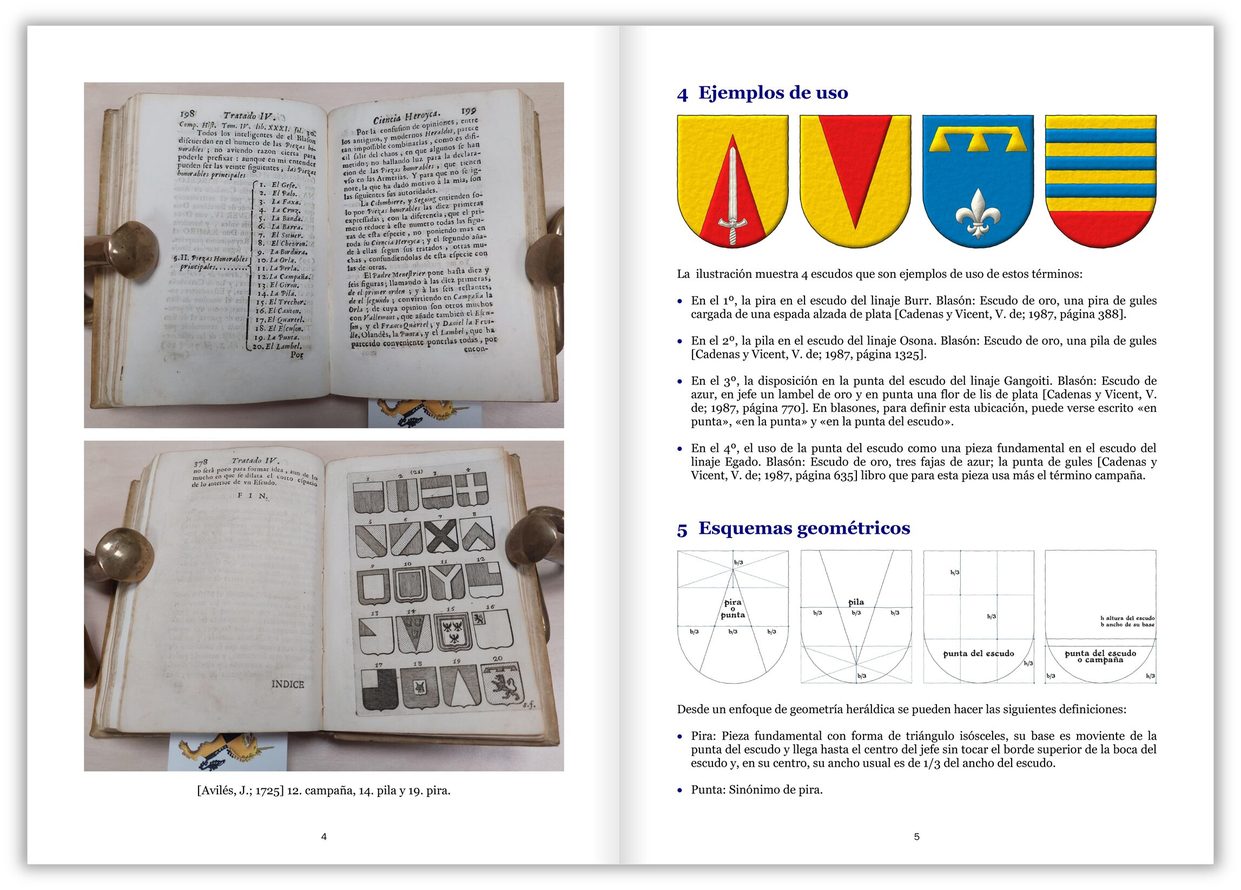



![Proportional scheme for the arms of the Kingdom of Spain Quarterly: 1 Gules, a castle triple-towered Or, port and windows Azure, masoned Sable [for Castile]; 2 Argent, a lion rampant Purpure, armed and langued Gules, crowned Or [for Leon]; 3 Or, four pallets Gules [for Aragon]; 4 Gules, a chain orlewise, crosswise, and saltirewise Or, charged in the fess point with an emerald Vert [for Navarre]; enté en point Argent, a pomegranate proper, seeded Gules, slipped and leaved Vert [for Granada]; an inescutcheon Azure, three fleurs de lis Or, 2 and 1, a bordure Gules [for Bourbon].](../escudo_armas/EspanaR.20.Esquema.2x2.jpg)
